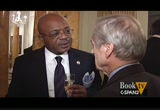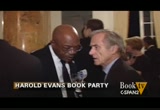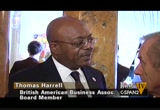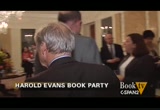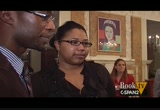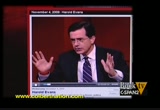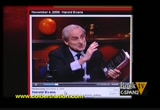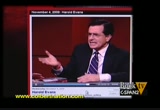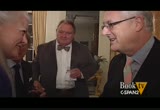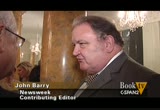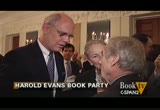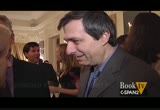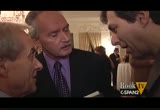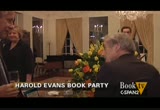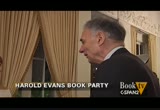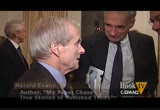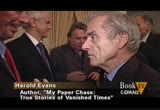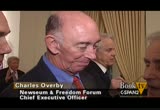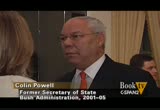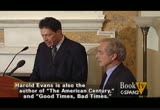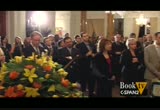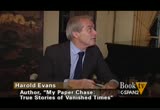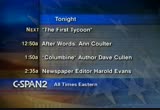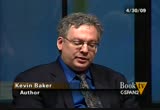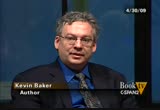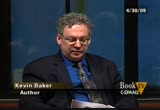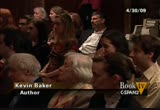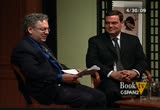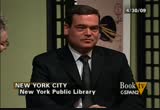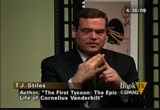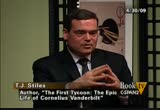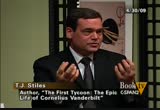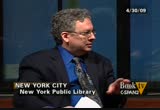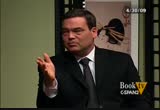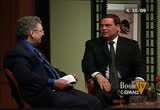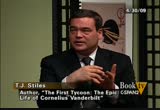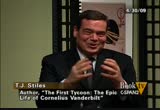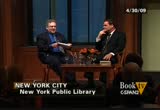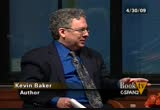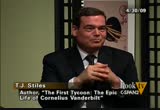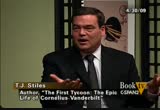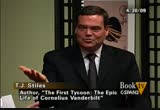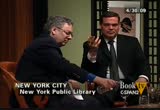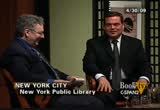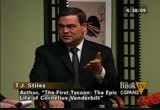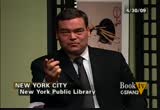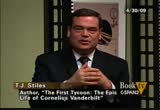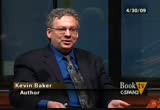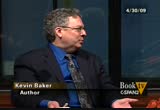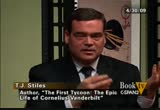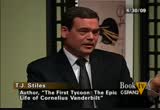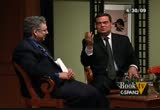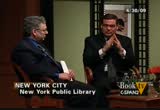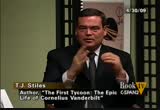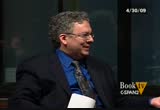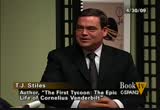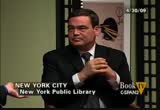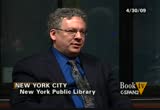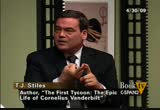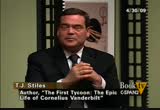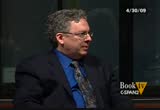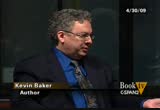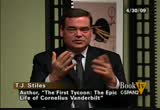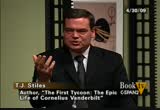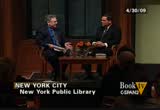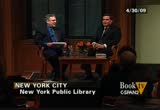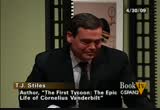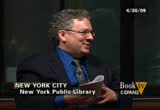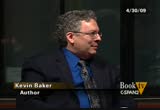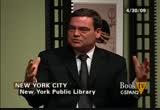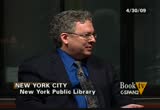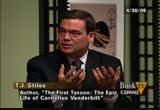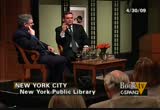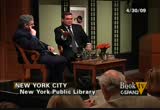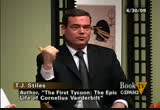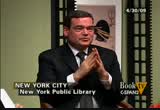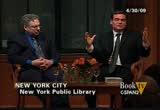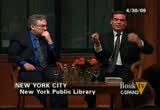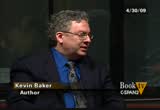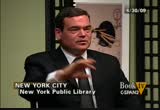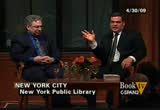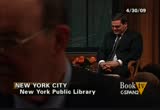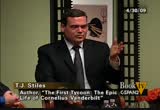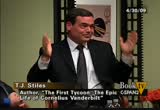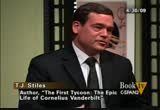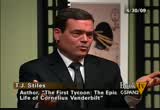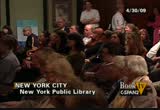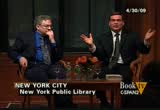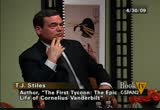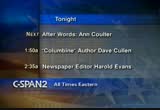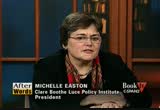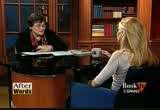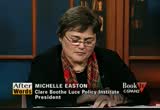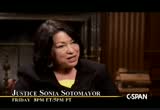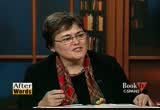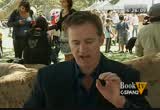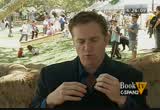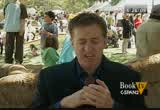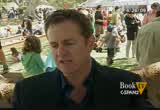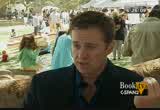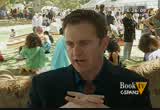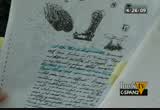tv Capital News Today CSPAN December 31, 2009 11:00pm-2:00am EST
11:01 pm
understand. not all of the congressman understood, or congress people, understand. we have as a country, we haven't really run our own ports in decades, so with the dubai port-- so nothing really changes on the surface. and really nothing changes on the surface-- >> is the democratic congress and the better? the democratic congress is not likely to be any different from the republican controlled congress. >> i don't even think they were going to be as effective. >> i was going to say there's a tendency for protectionism. >> absolutely which makes absolutely no sense but also for years democrats, in fact let me
11:02 pm
describe it, when bush, when w was elected the democrats went mad. because they lost their minds. >> yeah they did. >> for years there was this passionate hatred. >> i know and the motion was so intense. >> absolutely. >> in distorted a lot of judgment. i mean some good things that he did were kind of on. >> now that they are in power, what we are seeing now is this group force. >> i think that is a big mistake. >> it truly is. >> i voted for obama. i was very optimistic. i am less optimistic today for a variety of reasons. as you say, i think personally,
11:03 pm
he lets congress do too much. >> i had a fear of obama. talent, and my god, yes. he is a brilliant man but we had elevated our expectations. >> well, we did. >> it is unfair to keep our expectations on some one. >> that is very true. that is very true. >> take care, a pleasure. >> thank you. >> wealth gum harriet. this man is a writer, so you can speak freely to him, if not to me. >> okay, i will speak freely. >> what do you do? >> i work at the american chemistry council. >> which part? what do you do? >> i work for homeland security.
11:04 pm
>> homeland security? [laughter] >> don't worry, not here. >> what do you think about ft. hood? >> i am sorry? >> what do you think about ft. hood. we are not approaching you. >> absolutely terrible what happened down there. >> it was very tragic. >> very sad. >> one of my sons is actually station that ft. hood so he was there when it all happened. very chaotic. >> well, what is one of your jobs? >> yes, that is our job. >> i am holding you responsible. welcome, anyway. i am sorry to interrupt my friend. hello, nice to meet you. >> hello gordin, how are you? >> what do you so dramatic.
11:05 pm
>> let me introduce you to my wife, pat. >> brian kelley, mrs. kelly and paul gordin who is a fantastic influence throughout the nation through her programs. right? >> barry kind come indeed. >> seven years ago. i will never forget it because they went down there. u.s. all the questions, even the difficult ones. it was a wonderful experience for us. >> brian is the attitude of the u.s. news & world report." >> i work for "newsweek." >> well, nevermind. >> if he can forgive me, surely you can. >> were very diversified, the smart career decision, a very
11:06 pm
thriving business. >> my wife is an electronic seal know. speak well, you neal colbert. i loved it. i cheered. >> use diet? >> did you see it? >> he started off the first question-- >> you have a new book if i am to believe the press, called "my paper chase" true stories of vanished times. you, sir r. anitere, former editor of two of the greatest newspapers in the world, "the sunday times," the times of london. your actually old enough to remember the mandrell and empire. [laughter] and yet you don't write this book until you are 81 years old. did you not accomplish anything until you are late '70s? [laughter]
11:07 pm
>> i couldn't very wellspring out of the whelm with the form of a newspaper in my hand. my life was writing and editing newspapers and books, and then don't forget, every story, every night had to have a climax and now the climaxes tonight. i am on the colbert report. [applause] >> the next edition will have me in it. >> my book is available as mr. gore would say at friendly local bookstores at a ridiculously ridiculous price which does not reflect the blood, sweat, tears and sacrifice. >> i liked him. he made me laugh like hell. [laughter] >> you rose to every occasion and then, when sir harold turns
11:08 pm
to colbert and says, don't you need somebody to call the bleeped, that is rush limbaugh? >> that is right. >> i will tell you what i don't like about editor sir is that it is just censorship, isn't it? you are just telling people what they can and cannot print in this newspaper and what folks should and should not hear out there. why should i let a newspaper or an editor like you filter what i get to hear when i can go to a blog page and find out whatever she is saying about the afghanistan. >> it is like rush limbaugh is telling you about global warming. don't you want somebody to print the truth and all the [bleep]. >> i will tell you.
11:09 pm
what he said was the [bleep] of rush limbaugh and the whole crowd, and just-- colbert just roared. >> i lost my virginity. >> you didn't think you could get away with that. >> millions of us, of we were thrilled. >> ken, meet these people, come here. i want to mention to people to you, john and come forward. this is paul gordan, major media star in atlanta and throughout the nation. david young is the president, the emperor, the king and john barry is one of the greatest-- come here, one of the greatest reporters hill at fur refuse to accept my-- no. [laughter] he was the star in "the sunday
11:10 pm
times." >> i must tell you both i have taken a sneak peek and read the book, so you already have admires. i actually went to the store and bought it. welch. >> real money. >> real money, i am not used to that. i am used to people send me books. >> i am sorry. i should have done that. john has done more than the index. >> certification harrell has been very kind. >> don't go home. john is a fantastic writer and i can tell you hundreds of stories about him. , but i mean i never forget, when the french entered the gold rush, we got reporters and photographers--
11:11 pm
[inaudible] eight or 12 pages and he pulled the whole bloody lot together seamlessly. i will never forget it. you know i said i don't think i could have done that myself. >> what i remember about that is one of our reporters tony geraghty who was eccentric, but he on the flight home to paris, his colleagues sometimes would go with him and realized he was dressed in a business suit but was wearing tract shoes and had on a crash helmet and he had a large-- beside him. he opened it and it was full of canned baked beans. they said tony, you are going to they capital of the food world. he said i know, it is a revolutionary-- i have to be
11:12 pm
prepared. [laughter] >> he used to publish scoop, speak a lot of angst and heartburning. >> you know what it is like. >> do you know how much time i would spend? i would spend three hours. >> it was the only person that i got to interview where i got to ask him. [inaudible] stop yourself before he gets to that.
11:13 pm
11:14 pm
energy so i've gotten rid of everything. i was up at 6:00 this morning. >> no problem. >> i will do it. i have got the other possibilities including going back to blumberg and asking him for 10 million. >> i am so glad to see you again. >> i love your necklace. >> i feel like a dinosaur. >> i want to ask you about that beautiful photograph on the cover. >> it was taken by snowden. i often joke about that.
11:15 pm
>> you are a collectible. [laughter] >> congratulations, harry. congratulations. >> i am going to see you tomorrow. >> it is nice to meet you. you can't carry that without my signing it. >> yes i can, i am an irishman. >> doane stay oppen part of to layed so you will be fresh tomorrow. >> i am glad to be doing this. we are doing c-span. >> thank you very much indeed. >> i am going to say something here. >> you are from very.
11:16 pm
i want to introduce you to someone. john barry who did an amazing perspective on all star which was a huge controversial book. i am sure you will like it actually. >> i am very interested to talk to you about your perspective on where newspapers are going. >> he knows all of the answers. >> he tells a great story of going to harvard and how the kids say-- i wrote a chapter in the book. i had to take it out. anyway, i have one--
11:17 pm
>> were you at the press club this week? >> yeah. >> are you going to the book fair? that is wonderful. >> i am 1/3 shires, 1/3 englishtown 1/3 wells blood. >> the irish have a lot of sympathy for the welsh. >> the welch and the irish-- [inaudible] >> hey, is that the book. you can't buy the book without my signing it. i will sign it anyway. >> i will tell you that secretary powell is wandering around looking for you. he came by saying where is harry? where is harry? >> i will have to find him. name? >> trevor.
11:18 pm
11:19 pm
[inaudible conversations] i have go to fine colin powell. he is here somewhere. there he is. i have been looking for you. >> how are you, harry? >> nice to see a. >> people say why aren't you aging as well as colin powell? [laughter] >> congratulations. >> thanks for helping so much. >> anything i can do. it is my pleasure, believed to me. >> we are contaminating the
11:20 pm
world. annmarie and all of her kids have h1n1. they are recovering. >> my daughter had it. speech? i thought you know was going to give the speech. >> she gives a lot of speeches at home. [laughter] >> thank you for being here. >> it is an honor. >> here is to you. you know this man. >> this is christopher hitchens. >> from the earliest days. >> i am so pleased you are here.
11:21 pm
11:22 pm
11:23 pm
>> this is my husband, allen. >> we are testing political correctness all the way. >> we will talk later. i am going to go over and sign books. >> you have to speak. >> i am going to speak now. >> very nice to me you. >> i will just put to donald. i have got news for him. if i put with love, is that
11:24 pm
alright? keep it from my wife. >> ladies and gentlemen, we'll come. i am delighted to see you all here at the british embassy and of course a special welcome to harold evans and tina brown. we at the embassy are delighted to be participating in the launch of harry's book, "my paper chase" true stories of vanished times. the book covers, and i started reading it, the book covers a huge amount of ground from harry's childhood in the north of england in for a time, you will know this, you were living in eckels the few hundred yards from where juliet lathrem
11:25 pm
corrupt. then on to his professional career as a journalist, editor publisher and author, but this isn't just another autobiography. this is also a biography of the newspaper industry over many many significant decades in the book describes that almost industrial process of producing a newspaper over really the best part of the last century. now all of that is decidedly not an obituary for print journalism. mark twain said i'm not an editor of the newspaper angela always try to do right in the good so god will not make the one. [laughter] harold evans 14 ten-year ten year as the editor is "the sunday times" in year as the editor of the daily times of
11:26 pm
london, produced work of really extraordinary high standard. in 20001 journalist named him the greatest british newspaper editor of all time. [laughter] and he championed what yesterday's review of the book in "the new york times" called they crusading style of journalism in which he and his paper reflected the guilty and championed the innocent. and come the people of my generation who got interested in national and international politics very often did so because of "the sunday times" because of its fuller, its culture leadership and its investigative zeal but this is also a transatlantic story. herrle duggins first encounter was during the second world war in manchester and his heart-- fellowship began a lifelong association and he and tina have lived here for nearly 30 years. although tina doesn't remember
11:27 pm
it we were contemporaries at oxford and she had a knack of stopping the traffic there just as she is done here since. kerry's american career to cam to u.s. news & world report," a number of other top publications to random house and from publishing to writing including the award-winning at the american century. now you've harry and tenus are both now american citizens. i am not holding that against you but he retained extraordinary close links with the u.k.. this embassy and i wish the book every success. it is a remarkable story so ladies and gentlemen, please help me in welcoming sir harold evans. [applause] >> i can't be elevated so i have to do this. thank you so much for the excellent words.
11:28 pm
it is always good to come back to britain, which is where we are. of course it is a british territory you understand and not to go to the full malices approving who i am which is what happens of course when you go through any security. julia lived very close to me and he is likely because we never met. [laughter] because he knows tino what might happen if i had met the gorgeous julia coop became a scientist and like me ended up in the united states. tonight really should be a celebration, not only me but of reporting. that is what my book is about. it is about what newspapers can achieve, not what an editor can achieve but what the reporters
11:29 pm
on the ground can achieve. that is why i am particularly honored tonight to have been bradley here who represents journalism at its best and many other excellent reporter's here. i am also glad of course that we are here which is a synthesis i think of remarkable quality about what's best is going on at the moment in because few people apart from me to really read the newspaper every day, and so provides that synthesist as well. celebrating reporting means actually, which all this feel what reporting is, news is what somebody somewhere wants to suppress. everything else is advertising. [laughter] and in fact of course everyone knows the truth of that.
11:30 pm
when i was writing this book, i did get lost. especially in these times when people are questioning brands, and what it might do. and, what i was able to achieve it is not by me. a was idps reporter so when we were campaigning for thalidomide victims who were born without arms and very often without arms and legs on government approved prescriptions, and we won the great battle against the drug companies and against the attorney general in my beloved britain. i am still by the way dual citizenship so that may make it quite difficult for me then. we were able to do that because the reporters in question actually studied the chemistry of thalidamide and their remember going and saying the
11:31 pm
molecular structure of thalidamide and frankly nobody had looked at how this disaster occurred. ralph nader is here tonight, who was a tremendous support in the campaign and a lot of people supported and all of these campaigns. the largest air crash in the world at the time. congress began to investigate, so the truth about what happened to create that terrible disaster was left to the press and i am proud of what the reporters on that particular story did. or take another one, i am sure-- you can relax. and exposing that great cover up on the damage it did and the lives that he lost was extremely-- and i want to say again that was a question of reporting.
11:32 pm
now straight reporting is very important and investigative journalism is only an aspect of it but it is a very difficult form. "the sunday times" we found a team was a great way to do it in one of the things i am proud that that paper cheat was to bring some kind of understanding of the history and the currencies of what was happening in northern ireland, and john berryhill is here tonight part of the inside team and his team working through some of the most difficult circumstances ever, produced a fantastic book and report called perspective. when i was prosecuted by the i.r.a., which i was for suggesting to them some of the members were stealing money, i had to go to belfast and most unfortunately the guys that were escorting me took a wrong term and said get down, you are in danger. so i got down but it reminded me
11:33 pm
of what the reporters on the spot were doing every day. so that is what we are here to celebrate tonight. i have seen it happen more and more when really good reporting is being squeezed out of existence, often by mead head i called them, people who think the newspaper is a great way to make a lot of money, which it was, and a reporter or newspaper, so i think we have to keep reminding everybody journalism is not dead. the delivery of it will change so it must change so that is very important and i will always be very grateful that my publicist gave me the time to try and set out what a newspaper can do. and not just "the sunday times." what could newspapers can do everywhere. we have here tonight a very distinguished-- whom i knew in
11:34 pm
the 1960's and he went back to ben gold and his created the most wonderful publishing empire, television and investigations and actually central to democracy. when we drink tonight let's drink to reporting and thank you very much all of you for coming tonight. [applause] [inaudible conversations] >> i will send you a copy. you will have a lot of fun with this. >> i am so pleased. colin powell is in this book. thank you very much. >> thank you.
11:35 pm
>> thank you. >> deborah nelson, i was margaret carlson's producer at cnn and i enjoyed your green jobs conference last week. i was there, of course. >> it is deborah, isn't it? >> yes, deborah. >> i wasn't able to make it at the dinner at your home. we are in the same business. i am looking forward to meeting him. >> it is quite long. >> thank you for the call. >> thank you very much. you look great. are you taller than i am? yeah, he is.
11:36 pm
this man used to be a journalist. [laughter] >> i know him, for god sakes. >> you are so great. i am really honored that you are here. >> could god. [laughter] >> what are you, signing? >> yeah. >> ralph, how are you? >> thank you. >> thank you. tina is here. latino was looking for you. >> this is to ralph. >> do you want the three of us? >> the party is a success. all three of us are here. >> survivors.
11:37 pm
>> this is for you ralph. i put what i truly believe. >> it got a good review. >> it did fine. also in "the chicago sun-times." >> did you see the parade? >> thank you so much. i am so pleased to see you. >> thank you. [inaudible conversations] >> i love that. >> we did not put it together. yeah. "the sunday times." i did not intend to show that.
11:39 pm
author t.j. stiles recounts the life of transportation magnet cornelia after words in his book, t.j.. >> discussed the book at an event hosted by the new york public library. this is an hour and 15 minutes. >> thanks for coming everyone to this evening. it is a pleasure to be here at the library and the coleman center which has once again succeeded in green the publication and the outstanding work of literature. the first tycoon takes his place this year as the biography of record of one of the greatest and most selective figures in american business history. cornelius vanderbilt's career and shipping route routes and finance span incredible epic in the industrial development of this nation from the very
11:40 pm
beginnings of steam powered transportation to the tying together of the entire north american continent in a steel web of real. as t.j. stiles writes, view 19th century businessmen equals after words in his impact on american history and of those who did arguably none proved to be so influential and so fundamentally level over a period so formatives or so long. born in 1794 the commodore live to be 82 and played a significant role in so many of the leading events in this tumultuous life from the very beginnings of steamboat travel on the hudson river to the seminal supreme court case given at the establishing government's right to regulate interstate commerce and destroying the remnants of fuel culture in america the to transatlantic travel the california gold rush and the growth of the united states into a continental nation, the start of travel across central america and the planting of the seed that was to become the panama canal, the
11:41 pm
crushing of the notorious philip bussel william walker and his attempt to abscond with the country of nicaragua the discretion of the merrimack and the safeguarding of the union gold shipments both which played a seminal part in winning the civil war, the fabled manipulations of the erie breault road and the birth of modern corporations the consolidation of the great new york real plots into the enormous new york central and hudson river railroad, the growth of new york city into the first city of north america and a major world hub of finance and trade complete with his first grand central station. vanderbilt played a major part in all of these events and more. as stiles writes the commodore's live lets his mark on america's most basic beliefs about equality and opportunity. he started a business as the epitome of the jacksonian ideal the working man desiring only a level playing field to compete against the vested interests. he ended it as a symbol than the
11:42 pm
quality of monopoly in the gilded age when ameyde americans question for the first time the dangers of gigantic sum in business. he was instrumental in appointing americans with the idea of the modern corporation of enormous depersonalize business entity. win cornelius vanderbilt was a young man americans worked almost exclusively as farmers and small businessmen and what money they saw was mostly tsala coin. corporations were rarity and entities of lummis duration formed complete large public projects such as roads are canals before being disbanded. by the time vanderbilt died americans have introduced a paper money in stocks and bonds and even more abstract representations of wealth. even if they were still uneasy about it, getting more uneasy all the time. vanderbilt's own life cernan as an epic and started out as a teenage farm boy with a few years of grade school education
11:43 pm
sailing a ferry across new york harbor. by the time of his death he was estimated to be the second richest man in america with a fortune of roughly $100 million. to give you an idea of what that meant stiles right if vanderbilt cut some up unable to liquidate his entire state he would have received one out of every $9 then in circulation. by way of comparison if bill gates worth 57 billion at the height of the pre-crash wealth in september 2008 had been able to liquidate all of his estate he would have been entitled to one out of every $138 circulation. he did not come by this money easily. vanderbilt was a tough, capable and stunningly intelligent man and his life was one of almost constant competition. he fought in almost every other vreen available from this fights on the new york stocks to praising his steamboats up the hudson to a filing in defending himself and cal was lawsuits to battling for the business of dunces of steamship and realize that ran from connecticut to
11:44 pm
california london to panama. launching and lisk who is on wall street to whipping his prize trotters against fellow sportsmen along the upper reaches of what was then the bloomingdale road. contest that went on, on two occasions in his old age lift him pitched out headfirst on the road and look what to be fatal accidents. he was a hard man and hard on those around him including a wife he seems to have driven to a sanitarium sons and law discerns as his personal but felt the need to constantly prove their worth of. daughters who snubbed his second wife and barely contested as well a son who suffered a nervous breakdown and put up with all manner of insults from him to win his confidence in his place as his successor and two more sons to live tragic lives and never did gain his approval. he was also a man capable of love from the great works of charity in the last years of his life and even of sentiment as witnessed by his repeated attempts to contact told friends
11:45 pm
and loved ones through séances. it is they both personal and public story and t.j. stiles is done a magnificent job of guiding us through live crowded with the fence and the wonderfully named-- colorful supporting cast full of names such as james banker, henry cliff, george lock, fernando what, frank wert, simon chase, daniel drew, jim big phys, jay gould, emily thorned, curtis peck, tennessee claflin, victoria ear bud hold, the rest is corning, chaunce depue, horace greeley, a oakie hall, augustin show, john preen, asa rye a budde, orrin dolly's maran-- am i pronouncing that right, and horace clarke to name just a few. in short it is a terrific read.
11:46 pm
so, james pardon once wrote of the young thomas jefferson that along with his command of five foreign languages he could calculate and the clips survey and the state to tie an artery, the plan in edifice try a cause, break a horse, dance a minuet and played the violin. in the same vein one could say cornelius vanderbilt could design a steamship, sale litt over the open ocean and jungle rapids, race a champion horse run a shipping line, consolidated railroad short a stock rated corporation lobby a president bill gabriel depo found the university and raise an army. >> and all before lunchtime. >> that is right. this juxtaposition of skills as a great deal about what america became in vanderbilt's time but also in view of what is gone on in the country's economy and on wall street over the last two months doing general motors the
11:47 pm
amended plan for its own rescue for example in which it actually revise the miles per gallon as future cars are expected to go downward, and one saying that comparing these executives with their bonuses for going bankrupt i think is tempted to look at it vanderbilt or a morgan or carnegie or henry ford and ask, what happened? how did we go from that to this? >> i am going to do with presidential candidates to win debates and furs, thank you for having me here. eyes jim mentioned i was a fellow at the coleman center and it was an incredible experience without which my book would not it and possible so thank you very much to the staff including the manuscript department who do such superb work so i just wanted to make that very important thank you. that difference, that transition is visible during vanderbilt's life, and one thing i point out that sandra billed himself as both a pioneer paving the way
11:48 pm
toward the corporate future and also in some ways a representative of an older business world. he was sort of the merchant prince of the medichi mold as i put it, and by creating this huge corporation, the new york central and hudson river railroad it was i think in many ways the pioneer of the giant. but, his primary rival for the largest and most important corporation was the pennsylvania railroad. one of the four primary route routes in the country after the civil war called the trong lines and the pennsylvania railroad is interesting because its managers represent very much the modern model of management, and their managers were andrew carnegie's mentors, thomas a. scott two was vice president and president of the railroad and j. edgar thompson. vanderbilt was someone who purchased a controlling share of
11:49 pm
the stock in the corporation, moved into management and then what he would do is he would not take a salary. he would take only for enumeration three dividends on his stocks and this is of course the model we have moved away from. now we expect chairs to grow in value and there are some stocks that pay dividends. at that time it was the primary thing investors look for. a steady return every year on dividends so vanderbilt had to make his world. he had to make it profitable year and in year out to get any money. by contrast the pennsylvania railroad also paid dividends fairly successfully up to a point. >> by the way to explain this is mostly held stocks worked at the time. mostly paid dividends. investors weren't so concerned with the stock going up or down just making sure it paid. >> prices tend to fluctuate but you didn't see steady ever-increasing growth. is a matter of fact they were
11:50 pm
thought there is manipulation going on. so the pennsylvania breault rode have these professional managers who were not majority shareholders and what they did is they did things to make money out of the real wrote. they were pioneers of the sill corporation. thomas a. scott was famous in one case for getting, he was so politically influential that he got a bill for the pennsylvania legislature in got the governor to sign it 34 minutes after was introduced so they were very powerful and they would use their political influence to set up the shell corporations and funnel the real work business through these corporations of a controlled and in many ways like this that would funnel money out of the company, and they ran it fairly well up to a point, but when the panic of 1873 hit, their railroad had to stop paying dividends in the shareholders finally began to look into what they were doing. vanderbilt's roe wrote continue to pay dividends throughout the
11:51 pm
panic. as he put it he ran them as they were personal private property. how did we get here? you see within vanderbilt's lifetime the separation from management and ownership, the shareholders for not paying attention and that creates an incentive for the agents running the company to engage on stop in the side and not looking toward the long-term health of the company. it has been said but it doesn't guarantee malfeasance. >> where is vanderbilt seems to have been amazingly hands on. >> i think that is true and at the end of his life much less so, during, when he was a railroad chief and he actually testified before the state legislative committee. they said are you a practical manager? are you somebody out setting timetables? he said i don't manage anything. that is not entirely true because when he thought something was wrong he was
11:52 pm
entirely on top of that and people felt his wrath, for which he had an abundance but for the most him-- part uberlindquist operational control but he always had that someone was always watching. >> interestingly, always able to out compete other lines were drawn steamships or breault wrote, always said that certain genius for seeing how customers could be lured away. >> it is not a very sexy subject, but that is a consistent rate that you see in managers of successful managers the most successful of the robber barons. andrew carnegie is a great example, rockefeller. they cut costs and they were more successful with their rivals and cutting costs and vanderbilt once said that he could run a steamship or railroad for 20% less than the guy running along side and then he would close his business and go out of business. >> in fact it the end of the book when you have the start of the grange in these populist movements out west to have a
11:53 pm
huge complaint genser railroad that the air these preferential and often secret pricing system moving some goods for free and after words says basically fine, we would be happy to compete on an equal basis. there is no problem with that. >> what they are saying is they are complaining about the special legislation like thomas a. scott would have passed and others the row was get special laws passed in certain states and vanderbilt's response to that complaint was sure, great as long as the law is the same for everybody i'm on board. as long as the rules are the same i can beat anyone was his attitude. >> in that sense what was the very rough-and-tumble business time with a few public ethics, you get the sense he really was something of an honorable man in this sense or had at least something of his own sense of honor and how he conducted business. >> that is a really interesting trade of his because his
11:54 pm
business peers had this sort of love-hate is the wrong way to put it, sort of respect hate. i don't think anyone loved him. who was in business with him. but one of the things, one of the reasons why the book is longer than it might it then is i tried to write more than a business story. it is about the making of the modern american culture and you alluded in your comments to the end of the traces for feudalism or the culture of deference, that was held over in the 19th century for a while from the 18th-century, and vanderbilt's very first years in steamboats, i found these letters from these old gentry families saying they are undercutting prices, this is scandalous. have you ever heard of anything so scandalous? competition, this is awful and the idea of an individualistic
11:55 pm
competitive economy where it was basically no-holds-barred was this major cultural shift and actually gordon wood talks about this in the radicalism of the american revolution that business was not just business. it was changing american culture the idea of competitiveness was a huge shift in vanderbilt was very much in the forefront. but meanwhile there was a new code of honor that was emerging and it was sort of like the good sportsmanship almost any way and rather then we are all gentleman so let's cut deals with each other, which they did do also but it is a long story. read the book. but the new code was more about rabid than a gentlemanly code it was kind of like a fair fight coat and he very much stuck to that. he would say, i found letters here and the library, i sent for vanderbilt and we made a deal. he said you know that my word is as good as my bond and it was very important to him to develop
11:56 pm
that reputation. >> it is interesting because you have all of these what was there might be putting a ferry boat across the peers of the other guy's ferry boat could not doc, tearing up or burning down the other guy's ferry station might be okay, these crazy races. this is outside the purview of the book but the insane race between henry clay and the other steamship down the hudson which lasts all day. the amazingly wild race. they are basically throwing people off at their stops and they are racing each other. at the end of this henry clay's boiler explosion kills like 150 people right outside of younkers. this is basic commuter transportation at the time. like rival subway trains chasing each other. >> not only that but it was a spectator sport. it really matter to people that they were on the fastest boat.
11:57 pm
>> it really mattered, they were cheering on the ones that were not panicked and hanging on for dear life. >> the ones who insisted on being towed in a barge behind the boat to be close to the boiler when it exploded. >> in your book, that was, all that was sort of in a constantly reworked and you no sense of honor. that was okay but then all these people end up really respecting the commodore who are fighting them to the death for steamship lines and rail lines but then you get down to jay gould and jim fig-- bid jim phys goose seems to have taken it and a lot of people seem to have hated it because they stepped over the whole bounds. >> that is interesting too in the sense that you go from this early era of you know steamboats for a lot of business reasons really were very competitive, competition oriented business
11:58 pm
because singles were not that expensive as big pieces of capital, and physical capital. they were not that expensive. people could get together and build one and you could build up between markets. if you were competing for wild and water loss to could take it somewhere else. one of my favorite examples of that era of his is, that is in the book is in 1838 the staten island ferried owner ordered his captain of his very to room a rifle ferry and i found these court accounts from people on the ferry. >> and the passengers on the other ferry when they got to staten island they ripped down the ferry house and nearly murdered the president. unbelievable. then you get to the railroad era and what is different about real roads? they are fixed pieces of infrastructures to you could have a price war but what is going to happen at the end?
11:59 pm
you have to come to some sort of terms because the other guy's still there and do to the nature railroads because they were so capital-intensive and they had such a large workforce that even if you had no business at all, you are running hardly annie trains your fixed expenses from just maintaining and having a real road were nervously high. they didn't go up very much when you started to run more and more train so a railroad that was in bad shape would cut prices even if they were losing money was better than losing more money from not having the business so railroads, there is an incentive to undercut prices so vanderbilt's takes part in something that started before his time which is gentleman's agreements. he goes, why do you had in early america under the cultural of deference reappears because of business logic where you have these cartels and they had a elaborate cartels were they had commissions and they would hire
12:00 am
a commissioner who could fire from-- individual route what to wear undercutting prices and at the same time curiously after words by the end of this like is rising in social stature, so he is taking on a business that is inclined toward gentlemanly agreements because of the nature of the business. he himself is becoming more and more gentlemanly himself. toward the end of his life his demeanor was much more refined than it was when him was a young steamboat captain. ..
12:01 am
but they avoid actual jail time somehow. >> yeah, there were strict laws that regulated how much you could do. how many shares you could issue of a company. and this is something that i don't need to go into, but it has to do with all kind of cultural fermenting around the rise of securities. and people really thought that stock, a sure stock represented a hundred dollars worth of fixed capital. it was representing something tangible and real. so when you increase the number of shares without building new business -- new physical infrastructure it was widely seen by even the most intellectual figures as fraud. and so, when vanderbilts got into business with old and fisc andino drew over the railway you
12:02 am
a stranger cornered the market in the share so they just started pruning shears like crazy. and it was, you know, a very famous episode where vanderbilts got a judge to issue arrest hornets. here they are officers of one of the leading largest corporations in america are scampering onto a ferry at racing away from the police with literally bales of greenbacks and stock. and you know, they set up shop in what they called for taylor >> over in new jersey. smack over new jersey, yes. cartons they welcome them and made them a corporation of new jersey. so do try to settle gold went to albany with a suitcase full of cash and there were some hilarious figures from the nearest tape or just later they could see both sides of the issue depending on how big the suitcase was. and it finally vanderbilts actually miraculously manage to force them to pay back a lot of
12:03 am
what he is lost. but it's an incredible episode. >> he never forget that even though he tried to contact big jim fisk. >> one of my favorite example of that is about the time of the civil war is when vanderbilts starts to go to santas. and as a point on the book, this is, this is actually a hybrid of spiritualism in american life. in the civil war, the better part of a million people died and so people started to go to mediums all the time to contact the guide. vanderbilt definitely do that. i don't think you do any business, based in the business decisions on the séances. and not only because to continue to be successful, i personally don't believe in spiritualism so i don't think the median section were contacting the dead. so i think that they were saying a lot of nonsense when they would conjure up the ghosts. and vanderbilts clued into that also even though he still went to there's a great incident where he called up the ghost of jim fisk after fisk had been shocked by the rifle from the mistress shot dead.
12:04 am
so fisk sums up inventor built up him a few questions about the stock and of course the answers made no sense at all. vanderbilt says what are you talking about? okay, we'll see was right, you are me. or doing with the ghost of jim fisk. and then they start to joke with each other. he said had elected on the other side? and fisc guess ill find out an enough. and so it's a hilarious incident and it shows though i think he found comfort with answers but he didn't base any decisions on them. but that rivalry -- there's a quote that i never found a good source for it like so many of vanderbilts quotes but it's one of my favorites because it does summarize his attitude towards jay gould. he supposedly said it never pays to take a skunk. i never unfortunately i wish i could document it. i couldn't documented so i left it out of the book. i'll just tell you now because it was his attitude towards jay
12:05 am
gould. and though in the end, i have to say, in the most important battles either held his own or came out a little better with jay gould. but jay gould managed to embarrass him, which is one of the reasons why he was so embittered about ten. for example, during one more that yuri railway cut the price of cattle cars from the west. radically undercut them so the new york social river falls and they cut further. finally the world went from $150 a car for four cattle to 1 dollar a car. so meanwhile secretly jay gold and jim fisk are buying thousands of heads of cattle in chicago and shipping them over the mississippi for almost nothing. and they made a loud announcement to the press. they can just make an announcement they had to embarrass vanderbilts. but it was that kind of getting under your skin that just wrote him nuts.
12:06 am
and by contrast, this is something we talked about before. with other businessmen, they would have vicious fights and then they would end up being friends afterward. >> it's not personal finance, it's business. it's funny too because that story inadvertently shows the whole span of vanderbilts life in that he is one of the people who is competing against this whole time is daniel drew, the southern tories care or, for supposedly started watering stock, started off his career by watering stock into. she drove it down there and he would supposedly feed at lots of salt and then water it out to collect pond, which is where the courthouses are. this huge pond then nt would drive the cattle down there. they would drink up water and go on. that was filled in, begin the five points. the whole city grew up around here and by the end of his career he's fighting these wars over transporting cattle by the
12:07 am
thousands or millions from halfway across the country when this is all that changed the rail was have brought. to talk about another skunk for a moment, william walker who was what was called a filibuster, nothing to do with the senatorial mover, but the time referred to kind of a freebooter somebody who would go down and try to take over a country. and it was quite a ration of these in the 1840's and 50's. americans who decided to go down with an often handful of mercenaries and maybe start fighting in the civil war in a latin american country and then try to take it over. and this was considered a great theme by kind of southern and confederate leaning individuals who thought that this would be a natural feel to expand slavery. >> especially in the case of cuba which was, you know, after the fall of the spanish empire in latin america, of course,
12:08 am
cuba remained the star, the jewel of the spanish overseas possessions. and there was large-scale slavery there already. and there were a lot of cubans who were fighting very hard for independence as well. and there was also a large cuban population in new york, which my classmate alfonso perez is writing about. and cuba especially, the southerners who are looking to expand slavery were fascinated with. but walker was ended up landing in san francisco. he invaded mexico unsuccessfully again with a handful of men and then he got a contract to fight for one side in the nicaraguan civil war. so they sailed off with 56 men to fight for one side and nicaragua was almost a ritual civil war. in nicaragua was a country where
12:09 am
two times in vanderbilts career life he made radical changes in his career. and the california gold rush was the first of these where he had been in steamboat lines radiating out of new york's urban northeast. and then when the gold rush started, he abruptly got out of that and went into transatlantic and california steamships. and the main route of commerce and for much of migration was by steamship down to panama, causing that panama, up to the steamship on the pacific. in the inner belt started a rival line across nicaragua to build a canal, couldn't get funding. and they would carry people across the waterways of nicaragua by boat and short-lived crossing, very successful. he sold out, when none agreed to her of your upcoming issue very southern affairs then he started to buy control of this company come in the accessory transit co., once again at the very moment when he was doing that walker sailed off to nicaragua by lack.
12:10 am
he was a terrible general. >> is generalship usually consisted of just ordering frontal attacks against completely well dug in positions. >> which reflected the filibuster attitude, the north american attitude towards latin america was, you know, we're americans, so one of us is worth ten of them. so even though he dug in behind fortified walls and have the rifle, don't worry americans, go get them. go, go. and fortunately, once he, by luck really, he carries out one maneuver. by lucky manages to win. by luck the leading general and the head of state for his side died and he ends up being the strong man. he can't even speak spanish. and he's a strong man and nicaragua. and thousands of americans, you know, are excited by the success start coming down or want to come down and join in. and meanwhile this is a story which completely overturns the whole presumptions about how
12:11 am
this story played out. with papers i found out here in legal papers that are lawyer has here in the manuscripts department. most people said while vanderbilts rivals within the company knew he was taking control, so they convinced walker, give us control of the rights for carrying passengers and then we'll bring you free reinforcements and then vanderbilt realized he was betrayed. in fact, a friend of walkers went to the san francisco agent of the company, one of the guys who went to be trained vanderbilt and says look, your company is going to be destroyed. he said how do you know? walker is my friend and i will tell him to destroy. i think is going to give the rights to me i think. and i don't have any ships, you do. i'll sell the rights to you. and there was this hilarious exchange where garrison said, well, you know, i can't do anything against the company, but if they fall it really don't want to fall with them so okay.
12:12 am
and this whole story plays out with these political corrupt political figures, the self-interested characters who were woven through, you know, the 1850's especially. it was a part of american culture with political corruption and walker cared enough to nicaragua. so anyway, walker does this and gets the rights to vanderbilt and emmys. and vanderbilt tries to destroy this company as he buys control of it again. and vanderbilt and constructively unsuccessfully against the british to intervene. i don't want to help were various reasons. >> and walker brings back slavery and nicaragua, just a horrible. >> he had no interest in mixing nicaragua with the u.s. he had these napoleonic ideas that he would conquer all of nicaragua. the neighbors of nicaragua got worried about him so vanderbilts carried out his private foreign policy. he started negotiating with the neighbors, sent off, he found
12:13 am
this guy who had been acquitted of murdering his captain when he was a first mate. he was acquitted because no one saw it and he wanted the captain's cabin and it had been bludgeoned to death but no one saw him do it. vanderbilt sent him off to costa rica with dave creative gold and a rifles. he seized all the steamboat then cut off walker from his reinforcements. and it really is something out of a conrad novel. it's just remarkable. >> there's this one americans got a pink dashed >> captain scott. >> vanderbilt owes him something. he is obstructing everything vanderbilt is doing, refusing to hand over the ships. finally vanderbilts paid him back. >> thousands of people would have lived if vanderbilt standout to the guy initially who said, tell scott that i own
12:14 am
the company, you know, take control of the steamboat. the british epically bear and they would've protected the steamboat or walker. and they would've just cut everything off almost at the beginning. and this local guy who had vanderbilt had hired at 17 years old. the local guy says, hell no, i'm zero to $17,000 worth on the company until i'm paid i'm not cooperating. so as a result this international war plays out. and then later, when vanderbilt wins the war in vanderbilt sent out a guy again to take control of the steamboat then he chases them off the boats with a revolver saying i'm going to shoot you unless you pay me. and this one unknown character, because of his personal debt that hasn't been paid and that changing the history of about four or five countries. >> it would've been most logical for the canal to go to nicaragua in terms of the waterways
12:15 am
available. >> it seems that way though. i don't know the history of what happened. i do know that one of the consequences of this entire episode in which william walker in the north american takes over nicaragua reinstitute slavery is that when vanderbilt found when he tried to get the business going again, so we won the war, the nicaraguans would walk up to the line of allowing him to once again carry passengers across nicaragua and then they said we just can't accept the idea of north americans coming in. we must lost our nationality. we just can't do it. >> one of walkers things is in the midst of this whole war he burns down the capital. he just really ruins the country. >> yeah, absolutely. he really was devastating. truly an international criminal. he was a dr. evil of his day, only a real one. >> one of the instances which completely blanked from our past. it doesn't exist in america anymore.
12:16 am
it was made into a very bad, not very bad, but a movie. >> a movie that todd helicopters going and -- >> it's a very strange movie. another part of vanderbilt at war, the whole thing in which he went out to kind of fight with the merrimack or send a ship out to find out with the first ironclad which the confederacy had built what really threaten the whole civil war plan of the union which was to blockade the south. and all of a sudden, the south has built this ironclad ship that can think, you know, it's terrifying and thanks to american warships immediately. it looks invulnerable, kind of shows bouncing off. vanderbilt comes up with his own ship to combat this. >> and again this goes to the complex nature of vanderbilts because you know he was somebody who firmly -- and sure he never
12:17 am
read adam smith, but he firmly and believed in the invisible hand. everybody pursues their own interests as fiercely as possible. and he firmly believes that, you know, it's almost my duty as a citizen, you pursue your interest and decide for them. and he thought that's what everybody should do. but one of the exceptions to that if he was patriotic. ante up three sons. and he named them as i put it after his heroes, george washington, william henry harrison, and cornelius vanderbilt. so when the civil war came around he tried to give his largest steamship, which had cost them nearly a million dollars. he tried to give it to the union navy. and the secretary of the navy said no. he didn't think the war would last that long, you're never been on this expensive show. it's going to be a white element for the navy. he said no.
12:18 am
and so vanderbilts ended up being forced actually against his will to lease it for very large sums to the war department, complicated story that will have the free market people shaking their heads. because it really was a crazy result. but then the merrimack as he put it came out from the harbor thinks all these union chips and we know the monitor came down to union ironclad aldus to a fling himself in the standard version is the end of the story. at that point there was only one ship that could handle the merrimack and if the monitor had had the simple mechanical breakdown they would've been helpless. so secretary of war, stanton, telegraphed vanderbilt and said can you help? and so he rushed to washington, met with lincoln himself in the gazette, what can he do? about the do my largest steamship and they'll bring it down -- he said probably what will happen if they won't risk the merrimack against it. it will bottle it up in port and
12:19 am
that's actually what ended up happening. the link inside how much are you going to charge us? free, i'm giving it to you. within a few days he outfitted it. he did various things to protect it from shot and shell and brought it down personally with extraordinary thrill to decide how to be officered and deployed. he met with the union maven personnel. and that's how it worked. it basically bottled up the merrimack. they never did risk it against the vanderbilt. >> it was much faster than the merrimack. it could've been maneuvered impossibly rammed around. >> and then he reequip that as a cruiser to go after the alabama. and in my chapter in the civil war there's this whole kind of long-distance duel between captain sands of the alabama who want to get revenge against vanderbilt for giving expensive ship to the navy.
12:20 am
and he goes after the gold shipments coming from california. and there's a great little story that played out that the result of that. >> a hard man to live with it seems. a hard man on his family. constantly, you kind of hit that he took out a lot of his, possibly took out a lot of his business anxieties at home. and he was particularly hard on the sun, wanting them to live up to the standard he himself set. so the oldest, william has a breakdown after working for a short time on wall street. >> and for daniel drew. >> and goes and starts a farm on staten island. that's very successful. and he eventually comes back and inherits most of the fortune in the business. but the other two, cornel is an epileptic and has a huge giblin problem and is a mere do well his whole life.
12:21 am
and then, george washington vanderbilt is mysterious. he goes to west point and is in the union army, but is goes awol? >> yes, something that i founded the national archives with the help of the stop the debt the youngest son, george washington vanderbilt, was by all accounts vanderbilts pride and joy because of the three sons he was the only one who liked vanderbilt himself was athletic. vanderbilt was someone of just immense personal capabilities. 6 feet tall, 200 pounds, straight as an indian was the description. and this is a guy who got involved and one fistfights into his 50's. you know, he was not -- you know, he was not just good business. he was also a good card player, excellent horse racer, somebody who was just always out to compete and win under all
12:22 am
circumstances. and here his sons were, one of the put it cornel is a gambling addict and epileptic. william -- >> may have been. >> it is possible. and his son william was very good in business but he was kind of pudgy and unathletic and kind of a sad talk personally in his demeanor. and so here was george washington vanderbilt, tall, athletic and started the silverware. he went awol was court-martialed and convicted with student and a career back then. return to duty, was never assigned to combat duty. ended up getting sick and died during the civil war of consumption. vanderbilt was very broken up about it. i think that contributed to his interest in spiritualism. the thing about cornel is that it takes a lot of space in the book not only because he was an
12:23 am
important part of vanderbilts life, and not only because there's a lot of material about him, but because he was everything his father was sent. you know, he was physically afflict dead. he was morley, the way of vanderbilts thoughts, they didn't have the language for addiction that we do now. he was a real addict. and so he was boastful, a cheat, he was stealing money. he ended up, horace greeley for some reason became a special patron and friend. horace greeley died with cornel owing in tens of thousands of dollars. it was a source of great shame for vanderbilt and he never cut them off completely. his first wife that his attitude towards cornel was stubborn and consistent. this relationship -- is important in and of itself but it was one of the ways that have access to the moral or emotional complexity of vanderbilts, a man because of his great personal capabilities comes across as, you know, just this kind of
12:24 am
two-dimensional figure, the statue in front again control. whereas cornmeal, these conflicting feelings bring out the very human side and very understandable side of him. >> the whole tortured relationship at the first wife worried put her in the asylum for a while and took her out. and vanderbilt mr. says -- >> very hard to know. >> let's talk about the statue for a moment. the physical city that vanderbilt shaped. you know, he was this land speculator along with everyone also seems in new york at the time. he loaned money here and there. and built these depots. it was amazing to me the kind of the rise in the fall at the time. you know, you have st. john's park, which was -- gramercy park is what it was modeled after. it was a plot of land that was
12:25 am
the most fashionable neighborhood in the city to be in something of a rundown kind of abandoned neighborhood, to be in a real depot that vanderbilt built their, to be in the interest of the tunnel, -- >> holland tunnel. >> right there. nobody knows this place existed anymore in new york. it's forgotten out of modern memory. >> somebody taking gramercy park and ripping it down and having a tunnel exit there. >> 150 years later no one would have ever heard of gramercy park. it's amazing how fast new york was changing. and that's why they built a freight depot and that the original statue of the commodore up. which has been lost. >> i don't know. i haven't been able to track it down. maybe bill know what happened to it, but this freezer was on
12:26 am
either side. he was very much a gated part in lower manhattan very much like gramercy park. they put up this huge freight depot and other top was a statue of vanderbilt and this huge bronze frieze on either side that depicted his career and a sailboat than steam ships and railroads and whatnot. and that part of the statue was moved to the front of the terminal. in the frieze, i don't know what happened to it. and mrs. justine because i., obviously i think it's interesting, i wrote this book. i know one archivist at wells fargo. and so, i set out know if you like the book because william fargo is an enemy in the book. he said well, wells fargo is still around. in new york central railroad isn't. and i said, good point, except
12:27 am
in addition to his legacy and creating a corporate world in developing this kind of financial and economic as i put the unseen architecture of our world wearied he also, you know, built the central structure. he built the original grand central and what is now the tunnel that runs a park avenue, constructed a lot of the rail infrastructure that to this day is a vital part of the city. and he is a good reason for having a statue in front of the modern grand central. >> metaphorically it is the last stand. as the commodore standing and the traffic rates the mountain. the cars were just overwhelmed to society and the transportation still have it succeeded in tearing down grand central. but it's amazing the way this would all live. the depot was there because there was a law in the city against having steam powered rail below 42nd street because most of the city was below there and it would be a catastrophe for people being run over by. and then on top of this you have
12:28 am
the trains coming down. i love the description that early on with the trains are coming to the original grand central, they would actually decouple the engine from the rest of the train at a precise moment to keep the too much esteem from coming -- smoke from coming into the train shed. so you would come into new york and your train would slide off in your unpowered train would guide him. you know, just to think about how you must've been able to judge that, what a skill that must've been to not send the whole thing -- >> presumably they can slow down a little bit. >> is still, what an amazing -- >> we have to think about how new york at this time was a lowrise city. you know, as dickens described it in the 1840's which apply to
12:29 am
the 1860's and 70's it was a jumbled herd of buildings with here and there a staple sticking up. and that was new york. in the original grand central was this just massive building. it was the second-largest depot in the world, largest in the western hemisphere. just a gigantic building with enormous cost shed roof with 14 tracks. i mean, when they constructed grand central and much of it was paid for by vanderbilts personally. you know, he bought the stock that was issued for it personally. and this piece of infrastructure, even though the building is there today, it was a major contribution to the whole development of midtown and the spread of this area. and yes it was there because a certain loss, but it was his financial capacities and the planning of the sun that really brought it into place. >> and the amazing difficulty of putting a modern kind of industrial powers transportation and infrastructure into this hugely crowded city. new york has always been fairly
12:30 am
ingenious about. >> you try to build an underground rail system all the way down to city hall. and he decided it just wouldn't pay in the end. >> gap, he looked into like a subway. >> actually, chartered a corporation to do it and in the end decided it wouldn't pay. >> we decided that to this day, too. they charge everybody to 50. how was it in terms of -- >> i think we're running short on time. >> in terms of writing the book, how was it, you know, you hear the do or don't because they don't want to spend my time or with them. >> that's a good note to go out on. brenda mannix is a great biographer who wrote an article called what's love got to do with it? and i think there's a good point that. if somebody is interesting and the things that surround their life are interesting, then it's
12:31 am
okay if he isn't sop some of the time. the secret for me is either big questions? is their drama that the stories interesting? are there big questions so that it speaks to something that interests me intellectually? and then finally, they don't have to be nice, but they have to be human. much of the struggle for me as a writer was that they put with cornel pulling out the emotional complexity so that we may not want to spend an hour and a railroad car with him, but, you know, we can find out where he was coming from and its full complexity of the human being comes out. so i started to get into that it was really fascinating for me on the big and i'm a little level. and it was okay with me if he was sometimes a very hard man because he was a human being and that made it something that i could connect with. >> and the complexity certainly comes across as this outstanding
12:32 am
book. so thank you very much for writing it. thanks for being here. [applause] >> i guess if we have questions or -- [inaudible] >> do we have a microphone for questions? >> grades. and remember, no thronging. >> first question? >> anybody? >> one of the quotes attributed to vanderbilt that may in fact be apocryphal i think comes from the william walker era but may not be true is, he said gentlemen, you have wronged me, i would sue you but a lawsuit -- the law takes too long.
12:33 am
instead i will really new. >> yes, that is considered the most famous letter probably in american business history. and gentlemen, you've undertaken to achieve me. i won't sue you, the laws too slow, i will ruin you. yours truly, cornelius vanderbilt. the first time i saw that was in his obituary in "the new york times" in 1977. and i think not to -- not to careful writer probably took something he had heard that actually echoes testimony he gave in 1867 in a completely, 20 years later, an unrelated issue when he had shut off all train traffic into new york city, and other stories. and he said, you know, the law to my mind was too slow when i have the power in my own hands to punish. he said -- he said then i'll
12:34 am
take things into my own hands when i come. you know, that was a specific incident that was years later and i think it got translated into this letter, which i think he ever wrote. what happened is that here, on his grand tour of europe in 1853 and a private yacht that was the size of a trans-atlantic steamship. it became a minor "after words." and while he was away, his partners in the accessory transit company betrayed him and kicked him out of the company, held back money that was owed to him. and when he came back he was outraged the set the business for big as this travel. what he did was write a letter to the press saying i'm going to sue. what he really did was exactly the opposite. he said, if we can't settle this in the courts will decide. and of course in the end, of course they did not decide. he started to rival line and competed until they paid them off essentially. >> so he was essentially american? he was going to sue first.
12:35 am
>> is gorgeous to first, yes. this is something very interesting in researching this book a court records resolutely critical. and i stumbled into the old records division of the new york county clerks office. and i mentioned court records that are here in the lawyer's papers. and i cited and they just completed a computerized index of all the surviving court papers in the papers they are go back to the 1600's. and they would bring out condi know, i'd be next to people getting certified copies of old divorce decrees and i was almost the only historian working there. they would bring out these bundled papers wrapped in red tape and out have to be careful enough to not break them when i unfolded them. it had all these testimonies about secret deals that today would be illegal and the then they asked the court to enforce. inside trading, you know, they were suing because someone is inside trading is because they didn't divide the profits properly. and so, his lawsuits, he sued
12:36 am
again and again and he was sued again and again. and often it was just a matter of leverage and business associations. but he was never afraid of the courts. if he could do about the court, he preferred that. but to the end of his life he was in court all the time. >> is interesting when we talk about are all tedious society today. >> the first lawsuit that he filed with in 1816 when he was 22 years old. the lawsuit for which the papers arrived. and so, yeah, the litigious society goes on the way back to the beginning. do we have any other questions? >> two questions. first, do you watch "gossip girl"? >> no. >> do you know there's a
12:37 am
defendant supposedly on "gossip girl" and last week 100 tickets to the mets game. that's what it comes to, you have to be a vanderbilt to have season tickets to the yankees. second question. >> well, give me a chance to answer that. no, please go ahead. >> in your estimation, did any of the later figures, the one that we now know as robber barons, do they approached vanderbilts achievement, let's say andrew carnegie as it is probably the greatest of the group. i was wondering what you got about the ones that followed, the next generation? >> this is a difficult question because, you know, if you're a biographer you're automatically convinced her reddened about the most important person that ever lived. so, maybe my answer is unfair. i also think it's a subject is because even though they overlapped and vanderbilt l. personally with rockefeller and the overlapped with carnegie
12:38 am
also, who was wanting to sell steel roads to vanderbilts empire. one difference about vanderbilt with these other figures who are incredibly important and i take a very good case can be made that they are at least as important as vanderbilts. but vanderbilt covered a longer anymore formative period. so, the kind of corporate world in financial markets that rockefeller and carnegie and a lot of these later figures fell with, vanderbilt helped create. the united states, as the continent expanding country, vanderbilt played a role in simply the geographical expansion of the u.s. and as i said, the making of, you know, our academic values, vanderbilt was at the heart of that. even as a young man printing advertising that picked up jacksonian rhetoric very explicitly. so, so i don't want in any way to diminish the importance of
12:39 am
people like rockefeller and carnegie and later run for it or others what they did was incredibly important in developing the economy and also creating a lot of practices. jpmorgan, of course, in a very different way, you know jean strauss has written brilliantly about his importance. as a banker he intersected in that with so many other areas of industrial america. railroads and other areas. why don't want to diminish their importance. and to a certain extent, it's kind of needless to say well, who's up and who's down? but the distinction i would make is that vanderbilt covered this very formative. born in the presidency of george washington, starting a business of a teenager before the war of 1812 when there were a film in americans living on the coastal strip in atlantic. so, it's very hard to match a career of that length and over such a formative period as well.
12:40 am
so the case that i make, sort of humbly, because these other guys are so important is that that's a key to his particular significance. >> the most comparable figure seems to me in terms of the hands-on building of something is forward, who was someone who built the first carsey had, you know, adapted assembly-line. he worked out the whole plan to pay his workers enough to create a market for his product. and even ford didn't switch suddenly like midlife and go into building airplanes or something. you know, which is essentially -- he did build tractors and things, too. while that's true, but by the time he is kind of quasi- senile and they kind of take the plants away from him and everything. but it is, you know, vanderbilt is amazing in the hands-on part of it i think is almost unique.
12:41 am
>> and the giant leaps he made. one of the things about the book is it is also a history of the american economy just because he is such an unerring sense for the kind of primary channel of commerce and he would seize upon it and become the most successful competitor. so, you know, when philadelphia and new york were the two main financial centers at various transportation line ran. and then he is operating on the hudson and an industrial nation starts with text animals new england. so we enters the trade the steamboat or will row of new england and new york here it than the gold rush and he gets into that traffic. in one step after another he had an unerring sense for where this sort of vital center of commerce was and goes directly and manages to find a route in a transportation system that had a decisive, strategic advantage over his competitors. and then made it pay in a way no one else could.
12:42 am
>> microphone is coming. >> were their personal threats on him in terms of his own life or yet so many enemies? >> that's an interesting question because there's a book, the day wall street exploded, we've seen a lot of attention given to the fact that, you know, these titans have been threatened and attacked in the past. in vanderbilts cave, not that i know. as a matter of fact, he was famous even later in life when he was in his 70's and 80's and whether he really did this is an open question. but he had a reputation for excepting all callers in his private office on west fourth street in the washington square district. he would raise as kevin baker mentioned earlier, he would race as fast rodders personally through the rural roads of upper manhattan and engage in pickup races. and as i said in the 1850's, or
12:43 am
1840's, you know, the man was in his 50's. he occasionally got into fist fights. india this reputation, but i found court records for the guys doing in vanderbilts lawyer says vanderbilt shelley laid his hands upon him to remove him. you know, the guy ends up somehow unconscious. >> there was even dragracing in upper manhattan. >> he was a guy who could always take care of himself and i don't think he ever came in for personal threats, at least none that he couldn't handle. >> he dies just before the kind of class war in the u.s. really heats up. later in the year he dies, there's this huge nationwide rail strike that gets very ugly. i probably -- >> i mean that is something that i try to bring out in my book that i mean, one reason why in
12:44 am
god you're doing this event is your novels bring up the multilayered society in new york. >> thanks. >> so well. and of course i am focusing on wealthy individual i could only touch upon. but i try to talk about the fact that this is a society which is growing more polarized. but the larger rice and her prices are the rights of labor movement and mass armies of people working for wages, something new in america. and so the social complexity of america develops through his life. and so, it would've been very interesting to see what would've happened if he had remained alive and in control for a year or two more as 1877 was a violent, nationwide labor conflict. a really interesting and troubling episode aired >> and he goes for this guy who can't spell really to having his daughter -- visit his daughter that starts the society for
12:45 am
hundred? >> it was his granddaughter. i think in suggesting that william vanderbilt, vanderbilt had what was considered a substantial mansion. it's much like the novel. the people in that novel would've shunned him probably for much of his life. you know, he has substantial ground stone, but nothing fancier than not. but as soon as he died and as soon as the trial was settled his son and his grandchildren started putting up the huge gilded edge palaces. i think it's very interesting the debate itself the old man was gone before they started spending lavishly and having these grand. i think he would have thought it was a lot of nonsense. he would've spent a lot of money on a resource, but building a fancy palace would've been extravagance beyond his respect. >> of all of his accomplishments, did he never of
12:46 am
science, medicine? was that sort of gone? >> that's a good question. but a little side note, heat, you know, through much of his life what would encompass kind of modern science and technical education didn't exist. and he was a self educated engineer, essentially. he was probably one of the leading maritime architects of the paddle wheel arrow. he often went against conventional wisdom. c. was technically himself quite accomplished and it came engineering. when it comes to charity, he was a man who was not known for charity. he hated boasting, hated records, so they claim he engaged in private charity. at the end of his life, he did make a point of endowing vanderbilt university in nashville. however, i think there's good
12:47 am
reason that yes, he wanted to create an institution of learning because he did feel throughout his life the fact that he was uneducated. and every chance he had to speak and this is a great era of oratory. he couldn't have tea with someone giving out a two-hour speech. i think he did feel his lack of education, but also, part of this project with vanderbilt university reflect to part of his patriotism. having given a million dollar steamship to the union navy he made it very much a personal project to try to reach out to the south after the civil war. of course, he was thinking the white house. his second wife was an unrepentant confederates and he thought that was great. yet general braxton bragg who would do now and the tyrant and his wartime orders as a witness at his second wedding. when he reached out to the south, we're talking the white south. that it did reflect a sincere
12:48 am
taking him on his own terms the sincere patriotism that he wanted to kind of show that northern men fought for the union, wanted to restore the union "after words." so that's why he very much wanted to endowed university in the south. >> what would vanderbilt say to obama right now about what's going on with our financial system, with our economy? what would his advice be? >> well, you would wonder first toy black man became president. i think i would've found him. i think we're probably -- should we make this the last question? so this is the sort of question historians hate because, you know, frankly anyone if you could make an announcement on this and it would be accurate as anyone could say. it is underlay unprovable. there are two counterbalanced inside sudan.
12:49 am
one, he believed in was a fair which had been a radical philosophy but also neatly suited him when he was a corporate chief in the end. he did not believe in the government getting involved in the economy. as he once put it, when they were trying to pass a law in new york state to regulate the railroads, he thought in terms of private interests being the key to a well functioning economy. and he said, well, if you can pass a law that makes none man serve their interests more effectively than their interest themselves will compel them, that's fine, but i don't think you can. he got society works by everyone pursuing their own interests. on the other hand, he grasped the economy which after the civil war, the federal government had taken on unprecedented new involvement in the economy. when the panic of 1873 hits, he stepped in and said the treasury should be increasing liquidity in the market by issuing greenbacks and he was calling for unlimited but a clear type of intervention in the economy,
12:50 am
very much limited compared to what we're doing now. so, no, i can't tell you what he would say to president obama. but i can say at the very least he would ask had a sophisticated view at a pragmatic view. so he did have these clear laws a fair believes. on the other hand, he took the world as it was. and he saw what was needed to be done to make it work under the rules that existed. and so, he probably would have, you know, at the very least have a pragmatic view of what's going on. >> i think he would be a little astonished by businessmen who expected the government to bail them out and then who expected to have a major say in how they would run things. he'd be amazed at bats, the idea that you could rely on somebody else for the money and still expect to be in charge. i would kind of go against him philosophically. >> you make the bets and live by
12:51 am
12:52 am
my possessions are now in a storage bin. what i was able to get out before the house was locked out. this week on cue and day. at leslie and andrew cockburn. their award-winning documentary on the impact of subprime mortgages on minorities sunday night at eight. an hour-long interview program where we invite a guest host to interview the author of a book. this week linacre commentator argues that liberals have purposely cast themselves as the dems and guilty, liberal victims and their assault on america. she contends that the left engage in political while maintaining that they are oppressed. she discusses her new book and present their thoughts on the current lyrical and social
12:53 am
climate with michelle easton, president of the clare boothe luce policy institute. >> hi, i michelle easton president of the clare boothe luce policy institute in virginia here to interview ann coulter on her new book, "guilty." for c-span booktv is "after words." >> good to be here. >> you pretend five other about selling books. >> six. >> why did you write "guilty"? >> there was a little voice in my head saying, when is the next book coming? no, that was a publisher. it was just something i've noticed for a long time. how liberals use the ideas of victimhood to get ahead to shut down debate, to seek advantage, and assorted overtaken the entire world. where the real villains, the
12:54 am
aggressors, the perpetrators are always claiming to be mortally offended by been wounded, weep for me. and it's pernicious. >> when the first was coming out i remember nbc had but few weeks ahead and then suddenly they spiked two. what happened? >> guest: well, according to the always reliably drawn report and banned for life. those litigious long enough for me to go on the today show and not lauer told me and not be in for life and then the band went back into effect. >> host: what is that about? how can they justify that? >> guest: seven "new york times" bestsellers. massive bestsellers. i don't know, you look at the mainstream media. and they seem to like to pick their own concerns. they like more the illicit elizabeth hostel broke. no, their concerns weren't the ones we would pick as the conservative spokesman.
12:55 am
and i mean this is a trend with the last, with the fairness stock are. and as i describe in the book of the clinton judge wants to apply the finance law to the internet no, they want to shut down conservatives from speaking. it's an all-new world for liberals that used to be they had pretty much 100% control of all information, dissemination in america. now you have these tiny little breaches in the wall of sound with talk radio and with the internet. so what do they want to do? shut them down. >> host: early one morning, just around the time it was being published you are being interviewed by howard k. smith and i was watching it. he said you talk about victimhood at the more i listen to endure the 11 claiming victimhood. you are the victim of this great left-wing conspiracy. you should have a cross. what is howard smith struggling with? >> guest: well, i was very happy you had me on.
12:56 am
the today show would not have me on the first day my book came out. so i won't say anything critical of the beloved harry smith. he put me on the airwaves. i don't care as long as they put me on. that is becoming fewer and fewer. one thing about that, if a seven "new york times" sl your suit jacket on, you know, basic -- you can't be treated as well as naomi wolf would be if she puts out a book or well, many useless silly liberals. how are the many, many, many fantastic conservative writers ever going to get out there. i was chris warner going to get out there or heather mcdonald? we have so many fantastic in new york you could go on and on and on. with so many intestate right-wing writers out there and you're banging your head against the wall. just to get attention for a
12:57 am
book. when it's not hard for me to get on tv, what does that see about all the conservatives people know about? >> host: he also claimed and others have said you try to be funny, but he called it a sophomoric sort of view of things and it keeps people from taking you seriously according to him. i mean, what do you say to people who criticize your humor? >> guest: i mean, often these are set in front of audiences and i mean i suppose you could bring in a humor analyst to determine whether or not something is funny. i just know when a thousand people in the audience laugh. that means it's funny. somebody asked me about this on the radio yesterday. i was standing in the airport and there is a man standing next to me and she asked me about a line in my book.
12:58 am
i was describing how the democrats compete for victimhood and barack obama, while hillary was a big dump of the republicans. barack obama was a victim of hillary, of the republicans, and he won because he was the biggest victim. and they were describing how they were playing the game of who is the biggest victim in order to win the democratic nomination. i concluded, i think that where west, with a statement from elizabeth edwards talking about john edwards running against hillary and obama and saying we can't mate john black and we can't make any woman. and i said in my follow-up line they can't make him black. the woman was asking me if that's funny and i said there is a man standing next to me who overheard that and just burst out funding. that's how i know it's funny. >> host: your audience tells you it was funny. but beneath the humor you hold a deep commitment to the founding principles of this country.
12:59 am
talk about what you think makes america such an exceptional country. >> guest: there are so many things. i mean, a lot of it does come from a christian worldview, a christian founding, part of that is freedom of choice. so of course, all religions are prosperous in america. let it was disproportionately questions with a christian world. you found it -- i mean, part of what's interesting about that is, christ was really upsetting the customs of his day by using so many women for his parables, by administering to women so often. that was very unusual. so, as i've said before, the first feminist wasn't gloria steinem, it was jesus christ. and so there was this idea of the freedom of choice, literally
1:00 am
choice, not killing the beast choice. and also, the idea that all men are created by god and therefore no man has the right to rule over you except by your consent. but that's the idea of a federalist democracy that a king doesn't rule over you by divine right because the king has no genetic authority over you. ..
1:01 am
the that is in the long string of hoax hate crimes. i only listed a small portion of them in my book. after 20 years i think only come all these hate crimes usually on college campuses have turned out to be hoaxes. i can't think of a real one. if an actual races put it there is always someone trying to
1:02 am
bring to racism and when it is thought to be a burgeoning clan movement at columbia university will then the entire nation i don't know if you remember that there was a professor at columbia i guess about two years ago who was in the middle of the plagiarism investigation. she was plagiarizing for graduate students and some so they lo and behold finds a news on her door and for weeks the entire nation was fixated on this case and if you have been following the hate crimes for the last 20 years your suspicions would have been raised, your antenna would have gone up. i think they find a way-- in-band and the investigation from the very beginning. the police said we do not consider her a suspect. that is funny you would say that. when somebody is mugged you don't use the leap to say we don't consider this a self-inflicted wound, but i mean even if it had been something
1:03 am
that it hasn't been for least 20 years maybe longer an actual racist sneaking into manhattan to put a noose on a professor's door to have the whole nation transfixed by this is a little bit strange. you have on cnn now these claims, hysterical claims about growing hate groups in america, growing hate groups. i mean there are ways to measure these things like gain quam keston the various web sites denominators that tell you how many this had tours are going to this evette web site in sweetness analyte laude his indicated no, the hate club membership, there web sites there are about ten people a day clicking on these web sites. it is gone down but the media lies and says it has gone up. there to those members of the klan in america right now and about temper some of them are fbi agents watching the klan. their 5,000 people in america, 5,000 approximately, men who are
1:04 am
are aroused by watching videos of women in stiletto heels crushing frogs with the stiletto heel while speaking to the frog. so that is a bigger issue than the klan in america of and yet we have to act as if we are constantly under attack by the klan as i described in the book. why is that? blacks were the hit reginald victim group and they were authentic victims on like all these johnny-come-latelies victim groups. at the time during slavery and during the jim crow laws the democrats were on the wrong side, so the democrats they want a do-over now when there is no one in america defending racism. that is precisely when democrats are from the willing to come forward and stand up against racism when no one is standing up for racism. >> host: the new road about some real victims of racism and how they are treated. >> guest: like the duke lacrosse players. that is fairly well-known now for what, about a
1:05 am
year-and-a-half these duke lacrosse players being falsely accused of giving raping a black stripper. the professors signed a letter, completely accusatory letter in the administration did not stand by them at all hung them out to dry and the "new york times" ran article after article and i mean that really was kind of disappointing. which may sound funny coming from me but i am a "new york times" most turrell-- will reader. as long as you don't read anything starting on page 1, the editorial page in the op-ed page. some newspapers with last and one of them want to beat the "new york times" and that is usually what you can count on at times for good coverage. for example they had just this week they had a fantastic article on people with pets. i really enjoy it, but race was involved. they lose their minds and they
1:06 am
lied about the case and even towards the end, when a black stripper her tune out to be lying mouth, making up a story and the evidence was prepostrous they prosecutor push in the case was disbarred and went to prison so justice was done in the end but all this time you have the-- i forget if it was time and "newsweek" putting the initial defense mugshots on their cover. it was on and on. they revel in racism in america and it think it is because they were on the wrong side when the matter. >> host: these boys could have been destroyed. when. >> guest: in the end it is in my story and everyone moves on but it never happened. what if it hadn't happened that way? and there was always you can always tell who it victim as if they start talking about them being frat boys, the son of a frat boy or if they talk about the guy. whenever you hear daddy or frat boy do know this is the sweet emanuel goldstein.
1:07 am
the parents were not that wealthy. >> host: they could afford lawyers go. >> guest: what if they couldn't have? >> host: one thing you wrote about a lot of people commented on that sean hannity, rush limbaugh and george bush are at greater risk of assassination and barack obama. >> guest: in the last chapter i point out, i would not have mentioned it if they hadn't brought it up so much but drop the campaign you keep hearing about this unique risk obama issac for being assassinated because he is black, and this is unlike any other president or any other presidential candidate in the hold him for secret service protection. there was an article about i am so worried for you and in fact there were some liberal in britain saying if he is elected he will be assassinated so like i say i would not have mentioned it if they had not been dangling the big red tape in front of me
1:08 am
but in point of fact pretty much every presidential assassination or attempted assassination in the history of america was committed by a liberal, some version of anarchists, communist palestinian extremists. there are a couple at that didn't particularly have politics. some would include john wilkes-booth and that in john hinkley but in the wilkes-booth casey was an actor a, he was a big peace monger. i mean that was his reason for shooting lincoln. he said i love-- more than life itself and in the case of hinkley the jury did find him guilty by reason of insanity so i think we could ease that went over into the liberal category too. also open crazy left-wingers. >>host:is the point i have not heard anybody else make. >> guest: oswald try to emigrate to the soviet union. he had taken a shot at a united
1:09 am
states general. he was trying to emigrate to keep above. a lot of was set off, i forgot which one, was set off after reading a socialist pamphlet buy emma goldman. one after another so if anybody takes a shot it obama it is going to be his base. >> host: one of the things we are doing it clear boothe luce policy institute in this era of economic planning we are reading f.a. hayek's the road to serfdom and in the book he said the socialist needs a scapegoat to rally a majority for common cause. the question is has the american businessmen become the liberal scapegoat to rally the nation for this new socialist welfare state with welfare in socialized health care and forced unionization and things like that. >> guest: yes although i might say there is not a lot of love lost between me and wall street.
1:10 am
they all donated to obama. we are the party of the small businessman. they are the party of the financial and manipulators like george soros who i also read about in this book. it is curious that the three unofficial spokesman of the democratic party, george soros, arianna buffington and markos of the daily kos speak in the absence of their upbringings in foreign lands. >> host: what does that mean? >> guest: it means to do wait a few generations and that your grandchildren to the american bashing? could you let your grandchildren do it? at least as they say sean hannity and rush limbaugh speak decipherable english. come to think of it i don't know that is what arianna and soros and daily kos are saying. i can barely understand them. they could be talking about quilting or nba scores but i
1:11 am
think they were america bashing. >> host: you also write in the book about david gergen quote and his. it was during a cnn debate about the 2008 election campaign. he was discussing a presidential debate in he said quote mitt romney tried to argue last night about some liberal establishment which does not exist anymore. up there has been at liberal establishment it shrunk a lot. that is the '70s concept. how can a christian who has been around for so long make such a remarkable assertion? loan. >> guest: because it is david gergen. the grit is part about the quote is he was talking to ellen castellanos. whenever they give you do you know that all sensible people agree you know liberals are lying that is what we used to get all the time from a left before there was any alternative at all. was just act like people were crazy for talking about with the fact that the information
1:12 am
industry or slightly to the left of the island and pennino so they fox news came along and liberals discovered it was possible to present the news in a agenda pushing way. i'm not saying fox news this that the boy they sure got accused of it in for 30 or 40 years we heard no, we are just reporting the news. newsome auth habicht political context. said late they discovered it could have a political content. well, look at how fox news is treated in addition to the orwellian name to dr. in trying to shut down talk-radio but not any of the other news outlets because they are so fair. and the clinton judge trying to-- how about looking at how fox news is treated. people are so used to getting liberal propaganda when they turn on their tv sets. i think most people were not even alarmed, shocked, disturber
1:13 am
the fact that all the candidates for president on the democratic side refused to participate in a debate on fox news. they would take questions from a talking snowman on cnn but it was beneath them to go on fox news which has higher ratings than cnn and msnbc combined and i don't work for fox news. i never have. i like going there because i like their hair and makeup and you are allowed to him, to finish your point as long as allen is that on-- not there. hosts goody msm? >> guest: i miss him so much. both hillary clinton and ed rendell the governor of pennsylvania scant the ferris lx chemnick coverage came from fox news and yet the democrats want to to the like the klan. what is unique about fox news is and that it is a conservative station. it is not the conservative equivalent of msnbc as i point
1:14 am
out. what is the equivalent to the fox news hiraldo rivera, jack smith, who is that on msnbc? what is unique about fox mazen in general makes for more interesting feeling is that it is a debate station. you have a liberal and conservative not just a bunch of liberals arguing with one another or eight liberals and one conservative. >> host: which is what people want which is why fox is rated number one. >> guest: i don't think it is just because of my legal background. and you hear things on other stations and and you wonder, wait a second but what republicans say to that? i am sure there is more to this story. you get the full story on fox news and i feel like i am doing a commercial for fox news. i have no vested interest. >> host: is such a change. recently i was increase in the only news we had with cnn international. there was no fox, there was no talk radio.
1:15 am
it was a long week and my husband and i decided the folly looked at with cnn international i would hate america to math because almost every piece about america's negative and. >> guest: cnn international is something to behold. they make with cnn look like pat robertson, christian broadcasting network. that is something to behold. >> host: you write a fair amount about sarah palin in here who i am a great fan of. you write about the way the media covered her making up things like people were saying at her rally, kill obama, the way they handled the firing of republic safety commissioner because she let him go. she did not remove this trooper. >> guest: that is a good one. no one has sesame about that and what a lot about that is this with sarah palin's sister's sex husband two head tasered baylin's nephew, 10-year-old
1:16 am
nephew, made death threats against sarah palin and sisters father and then in addition to drinking on the job and so on and so forth. normally what with the legal perspective be on this? normally that would be a lifetime tv for women, made-for-tv movie. you have t.x. husband to taser the son and made death threats against the father. i think normally the liberals would take the woman's side on that but here suddenly for the first time ever the left's position was always trust the cop. always believe the cop. they never believed cops but in this case the guy who tasered and that is undisputed, and by the way i will be my own left, right here that 10-year-old son asked to be tasered. okay what of the tin earl said i would like to know what it is like to be shot in the leg. oh sure, here. >> host: and the death threat to the father. nobody said that didn't happen.
1:17 am
>> guest: it is the hypocrisy of the left that is so stunning. >> host: in the coverage of this it was amazing to me. >> guest: right in my position is sometimes cops are telling the truth and sometimes they aren't but then need to know the fox-- facts. the cop is always wrong and less -- >> host: you walser wrote about in here when sarah's daughter came under attack and right after she was chosen by mccain for vice president. obama, the candid obama seems so magnanimous. people's families are often, especially the children and his surrogates continued this forceful attack. >> guest: this is what democrats always do. a liberal democrat kinset back in be magnanimous and say i want to raise this issue or that issue. they don't have to because they own creations of the media. the media does it for them.
1:18 am
how was he in a position to run for president in the first place? the media knocked out his two opponents both of which probably would it be in him when he was running for senate, first in the primary democrat blair hull a wealthy investment banker. he was way way ahead in the polls and a couple of months before the primary election the media and seals sealed divorce records which speaking as a lawyer i am wondering what is the point of sealing something it the media can show up and say i think this would be interesting mr. judge, can you please unsealed this? it happens routinely in the case of an opponent to a liberal democrat so blair hull's divorce records were unsealed and divorce records as i say in the book is true is something said by an angry spells and a divorce filing. they are not and we partisan bald then you never know what the truth is. that is not the purpose of
1:19 am
divorce court to find the truth, it is to get the divorced and. people know there are routinely lies but first to get the blair hull's record, so they blair whole false behind an obama wins the primary. benno bum is facing an incredibly attractive republican candidates. jack ryan stunningly good looking, went to dartmouth, harvard law school, worked for goldman sachs, made hundreds of millions of dollars and left adel to teach in an inner-city school in chicago, rock-solid catholic, fantastic and even though this is illinois running to replace a seat vacated by peter fitzgerald, a republican. ryan probably would have been obey obeyed but luckily for obama his opponent was divorced from a hollywood actress and she claimed, so they fly to california, the media. it was the cost of the records
1:20 am
because their son together is autistic and that is why jack ryan one of the records sealed, to protect his son. we will unsealed these what this dal pan take out the and unattractive republican candidate and in all of this jack crane who accuses wet of having an affair. she said i was driven in the arms of another man because he took me to sex clubs in paris and proposition me and this became big news, the big news and republicans being pathetic as they usually are turned on jack ryan and four days after the records were unsealed he pulled out so who does so by march and up running against? god bless them, ellen key steps and then he is a brilliant, brilliant man but he lost. >> guest: no, because they have media stetson and does the work for a democrat which makes me want to wring their necks
1:21 am
when they stand up and safe families off the record. >> host: let's just take a break and we will be right back. >> the most symbolically meaningful moment for me during my public investiture, and it was sitting in justice marshall's chair and taking the oath with my hand on justice harlan's bible. it was like history coursing through may. >> are interviews with supreme court justices conclude friday night at 8:00 p.m. eastern on c-span with the soucy justice sonia sotomayor and retired justice sandra day o'connor and get your own copy of our original documentary on the supreme court on dvd. it is part of c-span's american
1:22 am
icon collection a three disc set including programs on the white house and the capitol one of many items available at c-span.org/--/store. >> host: hello, it is michelle easton at the claire boothe luce policy talking about ann coulter and sherbrooke. "guilty" liberal "victims" and their assault on america. door in the past presidential primary season the media attack machine turned on their beloved bill clinton and said journalist at visit clinton had changed rather than they were finally telling the truth. what happened? >> guest: right, that is the
1:23 am
chapter on the nonexistent republican attack machine, the imaginary phenomena that scares liberals more than any other than global warming, and that is i mean i didn't intend for this book to be as much about the media and politics as it was. wanted it to be more on this victim culture. but as i was writing the book during the 30 years' war democratic primary every time i walk for a room with a teague young i would hear some democrat fretting about whether the democrats going to do, or what the republicans going to do and the republican attack machine gets a hold of this. can you just sit there like a dog listening to a high-pitched noise. i wish we had an attack machine. and i looked up on nexus how often the republican attack machine have been what mentioned in a one year period. i think it was 800 times. i have that in the book and tried both democrat attack machine for the same one year
1:24 am
period and it was mentioned a handful of times by conservative columnist saying you know there's a democrat attack machine too but as i point out that is absurd. the republican national committee and the democratic national committee are like mosquitoes around the king kong of the media of trampling on cars and frightening japanese dextrose. and it is the media that gives the marching orders to the democratic party, not the other way around. i have one example of the "new york times" reprinting obama campaign talking points basically verbatim after one of the debates between album and mccain in listening just as an objective news article from "the new york times" as sometimes they get their talking points from the campaigns but usually it is the media that is calling the shots in the democratic party and one example of that, you mentioned earlier and we
1:25 am
didn't really talk about it and that was the story about the zero palin rally which by the way were much bigger than the obama rallies. sarah palin would get twice as many people. that in the great orator and the story went around and there were angry denunciations send these crazy right-wingers that whenever she would mention obama's someone in the crowd would yell out, kill him. and just a little note to liberals if he were going to make up a hoax to probably should not do one that is going to set off the secret service. they take that kind of thing very seriously, needless to say even service officer spread throughout the speech interview all of them. their lots of people with tape recordings part of the secret service spends at least a week maybe two weeks investigating this claim that someone in the crowd was yelling out, kill him and decided it was a hoax. who made up that story? does someone from the obama that
1:26 am
ministries to make up that? based on doctrine documents and a crazy man literally foamed at the mouth when he was being interviewed by the press. that was dan rather, mary mapes and cbs news in mary mapes, dan rather's producer on the fake national guard story called jill lockhart he was running on john kerry's campaign to tell and to talk to the net to foams at the mouth when he talks to the media. that was their source of that story so it is the media that is spreading these stories and even the democrats are virtually blameless compared to the only attack machine that matters the media attack machine. >> host: you wrote about how joe the plumber's life became hell when he asked a simple question about barack obama's economic policy. >> guest: i think that is relevant now as the democrats are telling us how fabulous it is going to be when the
1:27 am
government has computerized records of all of our medical forms. owen they will be confidential, will they? i think joe the plumber's records were supposed to be confidential too vignette those came soud and linda tripp's confidential records came out and what was the 800 republican files were supposed to be confidential. remember there was a human cry when someone at the state department had looked at the visa records of obama and then the story faded when it turned out they had access the records of mccain and it was just some nosy person that the state department so don't tell me our medical records are going to be safe and secure after what was done with surprising frequency to republicans or conservatives that are dangerous to the left. the only good news about getting all of our computer records on file in washington is we can finally find out whether bill clinton had syphilis. he would never released his
1:28 am
medical records if you recall. get it all on file there. >> host: another thing you wrote about wonderfully was when sarah palin was up the convention and she said what is the difference between a pit bull and a hockey mom and she pointed to lipstick. she said lipstick and a few days after that obama's said you can put lipstick on a pig but it is still a. this is just an expression we have an illinois. visit nothing to do with sarah palin and the media buys that. >> guest: we lost that. was hashed out-my my editor want me to cut that because this has been hashed out. i said yeah, but we lost and i saw a leche conservative saying oh yes i am sure he did not mean that. a, you know you can see them in the background talking and whispering and laughing. that is clearly the way they took it and i think it is preposterous to say that is and what he meant. gid various examples, one
1:29 am
unrelated to, anyway unrelated from dr. strangelove. the movie was being made but then it came out after kennedy was shot. they had a very funny line but slim pickens. they are going through their emergency supplies and a candy bar, bubblegum, whatever it all is and slim pickens says a fellow could have a pretty good time in dallas or something to that effect. they changed it to vigorous. is lips if you look closely he can see he was still saying dallas because of an antecede need then to. what if right after dick cheney had shot his friend in the face someone said that dog don't hunt or after we find out about the john edwards suspected love child, telling about edwards and sing don't throw the baby out with the bathwater, get it? to say this is an expression, we know it is an expression. the point is it was set after
1:30 am
probably the most famous political speech, the most watched political speech i would say in at least 20 years and that was the most famous line from the most famous political speech in 20 years, sarah palin pointing to her lips and saying lipstick and also iran through various headlines. there were a lot of jokes about sarah palin's lipstick and what is the difference between sarah palin and i thank and muslim extremists, lipstick so headline after headline dozens and dozens of headlines in the two days between her speech and obama saying about how you can put lipstick on a pig. >> host: you wrote about kathleen parker ian "guilty" and some of these that turn so viciously on sarah palin. >> guest: suddenly conservatives we have never heard of become the spokesman, that is right all the tv shows
1:31 am
that won't have me on. i cannot be a conservative spokesman by you attack right-wingers and your phyllis schlafly, your ronald reagan we incarnate. have you ever heard of this kathleen or kathy parker? nobody ever heard of her before. >> host: she certainly became a media favorite. we all know how that works. you turn on your own and suddenly-- >> guest: yes or be a complete embarrassment like another example is that i brought up in the context of the total media of blackout on the john edwards having an affair on his cancer stricken wife. for months there i had to get my news from the national enquirer. >> host: at the same time the "new york times" was running a front-page story about a supposed if there mccain which apparently was totally bogus. >> guest: which they finally apologize for. i had to get my nose and that--
1:32 am
news from inquirer. fine soud it is true and all this time i have a memo from one of the editors at the "l.a. times" destructing his blogger apparently the blogger should not mention the john edwards story and "the washington post" and added to their said well he dropped out a month or two earlier. will be a star running for public office so i don't think we need wall-to-wall coverage. is set the standard now, because i don't think rush limbaugh was running for anything when the drug story broke more per cautiously and again in elevation of someone-- resch at least is the most important conservative than america. okay but how about ted angered and evangelical minister i'd never heard of his sadly becomes the pope of the protestants and by the way we don't have a pope. in fact we don't even need a minister. i know a lot of ministers in
1:33 am
america. i give speeches at megachurches all the time. i have never heard of this guy. i'm sure he is very big in his little area. that is another one cnn is doing a big profile on. he was not running for office and he wasn't even a prominent conservative. here you have john vetters who was the last candidate for vice president a likely possibility for attorney general, some cabinet position, the total media blackout. the only boy you knew he was still caught in a totally embarrassing sex scandal was suddenly he was whitewashed of the news. if somebody brought it up the cut to a commercial break. >> host: it is unbelievable. you are a lawyer by training and i'm wondering what you think of barack obama's impact on the supreme court? >> guest: judging by the rest of this leadership does the policy he will probably try to pack the court and i think it will be a disaster.
1:34 am
we don't have any indication yet. we don't have any resignations yet but he has tried to continue the policy which i so love of george bush in the war on terror. >> host: keeping-- gates was interesting. >> guest: we are not pulling out of iraq any sooner than bushwell that. he is doing stupid things like moving the focus of a war from iraq where we were winning to afghanistan where we will probably lose. that is the stupidest thing imaginable and he did that for politically correct reasons because the crazy left-wing base demanded the democrats say we will pull out of iraq but we do need to engage them some place as george bush and many people kept saying rather than on the streets of new york. do you want tataris flypaper someplace or there and by moving it from iraq to afghanistan he could be creating the next vietnam. i hope it does not turn out that with a peter the great had
1:35 am
trouble in afghanistan. the russians lost in afghanistan. that is not a good front for us. why did he do that? because he had to please the democratic crazies. >> host: i sort of wondered if the first couple of mornings of the breathing scared the jesus thought of him. we don't know how bad it probably is but those are the real figures of the truth about who was where and what they are doing. >> guest: that is what cheney said and i'll note it was, because they do have some democrat friends. enduring the campaign you know i kept going to them and saying are you crazy? you are going to vote for this guy? is going to shut down guantanamo and they would say to me, he is not going to do that. so normal serious democrats just assumed he is just doing that for our crazy base and by the way under no circumstance which
1:36 am
republican president would say something simply to please the place-- base. they may still be some things he double crosses on and then he will lose like george bush raising taxes or reagan did not get around to abolishing the the purpose of education and given the choice between the department of education and the soviet union i will admit it is close. >> host: you started your career is a lawyer and graduated from the university of michigan law school. he did the law review there. you worked for the senate judiciary committee and litigated for individual rights and i heard you. you say don't go to law school. why not and what should smart young people be doing? >> guest: there are too many lawyers. i mean as a practical matter, it is not a particularly good way to make a living. it is based on billable hours.
1:37 am
less you are going to be a scumbag trial lawyer and make america a much worse place in ticket 1/3 recovery from these lazy personal injury lawsuits. >>host:like john edwards. >> guest: or go to the corporate counsel or be a prosecutor there are too many lawyers and it is the hard way to make a living. so one thing i do say is if you really think you want to do tedious work and makes xeroxes 20 hours a day, at this is your life ambition and you love the footnotes, actually i kind of like the footnotes. >> host: you have got a lot of them in here. >> guest: law school is fun, of large review is fun, working for a judge's fun but being many forms of government lawyer such as prosecutor, a lot of those can be fun and don't pay well. if you really want to practice law go to law school but what i
1:38 am
find with a lot of students is, nobody knows what he wants to do when he is graduating from college and i asked all of my most successful french in their 30's a few years ago did you know this was what you are going to be doing when you graduated from college and they all said i had no idea this job existed. a lot of kids they don't know what they want to do and are expanding their options. once you are on that treadmill you will gets sucked in a notice practicing lawyers when they get a chance to leap off the treadmill, they take it. >> host: but what you tell smart young people especially young conservative women? where do we need them most? >> guest: affair conservatives i tell them to go on to the media, to become teachers are college professors, to go hollywood. if there liberals i tell them to go to law school. >> host: you do a number of college lectures. you do it for claire boothe
1:39 am
luce, young america's foundation. wonderful job. when hillary clinton was running for senate and she would go around into college appearances she would have a restricted audience and often the left would control the questions. do colleges ever let you restrict the audience and have restricted questions? >> guest: no and that is really crazy. the reason that is crazy is i mean i believe that some point george bush, they did have to have some restrictions. why is that? it is because liberals show up and start screaming their heads off. that is what the problem is, crazy liberals. he did not have college republicans disrupting speeches by michael moore i promise you and by the way i wrote about this in my last book the college lecture circuit and one interesting fact about it is at harvard, at the good schools, it
1:40 am
basically any ivy league school and the equivalent they are not standing up screaming and they are not throwing food. they are smart enough. i will take questions until they have collapsed of exhaustion. in the southern schools they are far too chivalrous and bright i might add, the best region of the country, the self. it tends to be the bush league schools out in the middle of america were obviously there are some smart students. but, you also have some students who probably should not be a college in baird ginned up by lunatics like bill ayers college professor of. 82% of the membership in the underground is teaching on college campus. those people are just animals and so with anything a conservative on a college campus would have a reason for restricting the audience. we don't but i don't even know
1:41 am
what a liberal would need to restrict the audience. in hillary scaife she needed to restrict as i say about a possible assassination threat. hillary was getting crazy protests from codepink. >> host: you are a graduate of cornell, university of michigan law. i can imagine they have many alumni that are "new york times" bestsellers. that have the administration brought you into speak in mentor students who might aspire to have careers like you? >> guest: oh yes, once a year i would say. going over the curriculum and what my course curricula was to make sure this doesn't happen again. how do she get out of here like that? court now pass me off to the university of michigan law. you can take care of that. we didn't solve this problem. >> host: unbelievable. the left on campus think they
1:42 am
are so brilliant. they claim victimhood. they are against jaden bair for tolerance but i notice he spoke at the university of st. thomas and st. paul minnesota. even though she hadn't been there, she could not mention one specific in with the students it was it makes you audience gave you a standing ovation and at the university of arizona a few years ago some of those leftist boys threw a pie at you. >> guest: and mist. they throw like girls. >>host:they throw like girls. why don't these anti-hate campaigns sweden these liberals who are obviously so in tolerant of you, ann? >> guest: the idea of a college campus with their always bragging about explaining why they only need to work two hours a week is that it would be the freedom to investigate different areas and they don't want their freedom of speech and the freedom to engage in research
1:43 am
and it would be wide open, free challenging debate, so the fact college tuition has way outpaced inflation and they are paid more and more to teach two hours a week and then get every other year off entirely would be a little more justifiable at college campuses were exactly the reverse of that. bear the most intolerant. there's a least freedom to research. they are close minded. they are angry that any dissent from the prevailing. you have more open debate on a subway platform then on a college campus. >> host: they almost try to convince people not to even listen even though you never 107 "new york times" bestsellers but there are other parts of gear like that i suspect some of our audience does not know about like that you were one of john kennedy's associates at george magazine, the editor so i think that might surprise some of our
1:44 am
listeners and i wanted to ask you what other different kinds of people like that have you worked with to the years? >> guest: i would want to run their reputations but i do think that is a tribute to john kennedy jr.. are really to think george magazine was a terrific magazine and it was because he did have lots of different views and he was interested in sponsoring debates and i mean he was just a magnificent man and not a doctrine liberal at all. it paid off, jackie o. keeping her kids away from the rest of the kennedys. >> host: it seemed that way. >> guest: it was really great loss. those would have been one of the most fun political magazines out there but it could not survive his loss. he was george magazine. >> host: early in your career you came to washington and apply to be an intern at the national journalism center. i i don't i don't inside because i have some relations or involved there.
1:45 am
>> guest: came in get back to the book? i don't know what you are going to say. i just it's very uncomfortable when the subject is an culture and not the ideas. >> host: what you think of our secretary of state? >> guest: a lot better than william ehers which i considered a possibility under obama. no, i mean i will say one thing that sort of surprise me since the election that john mccain of the nav seems two of actually ben wendover and tax cutting because he voted against both bush tax cuts. he was a big proponent of manatee. he wanted to shut down gitmo. i would rather have them get the blame rather than us, and it is just something about republicans. they go for the next guy in line. it has been a disaster. they will not learn. i think michael still needs to punish their early primary states are any states that allow
1:46 am
democrats and-- to vote in the primaries but when john mccain was nominated and when before he chose sarah palin, who was the one i ended up voting four, and that was for cerak, as between hillary, clinton and john mccain i will take hillary. they are about the same and we would get blamed for it and that was something a lot of us learned during the bush administration like with amnesty. you want to support your president, your party that is in the white house and a lot of the spending runs up. a lot of the things that her republicans and i think george bush was a magnificent president in many ways particularly on foreign policy in protecting this country from terror but he was a liberal in some ways. other than the fact the country is going to be a third world country on the basis of his stimulus bill, other than that little detail i'm enjoying being in the insurgency.
1:47 am
the angry insurgency instead of having to be the governing majority. >> host: it almost makes you numb, doesn't it? and i think people are starting to realize that. >> guest: it has only been a month. >> host: let me ask you this. all of your books have been "new york times" bestsellers. deep in your heart on an esoteric topic that you kind of like to do, even knowing it might not be a bestseller or by all of claire boothe luce? >> guest: no, nothing in the nonfiction realm. there non-fiction books i want to write but i but not say there esoteric topics. the only unusual thing i would like to write someday is a novel. but generally your agents winds when you say that because everybody wants to write a novel. >>host:i have watched so many interviews of you by liberals that there overtly hostile from
1:48 am
katie couric, joey bakhtar the other day. >> guest: i like that one. that was fun. >> host: it was fun. >> guest: she is the fun del. she did not buy into the political correctness so i like her. >> host: is there any question from all of these liberals that he was the one that fast? >> guest: there are a few that i am surprised they haven't asked me and one person ask me, i don't think it was a liberal on a radio station but seemed like such an obvious question on chapter 2 that got so much attention on single mothers. it seems like such an obvious question, what about barack obama? the answer is he was basically the equivalent of being, oh and i think everyone knows what is in that chapter but quickly it is single motherhood, single mothers are held up of the personification of selfless virtue and how this policy or
1:49 am
that's dfx policy when there that biggest victims of all. there is a lot of data and that chapter but i have talked about that and one of the interesting things i found in research in that chapter is adopted children turn out better than non-adopted children so and on what mother has two choices for a child, the best possible light for the worse possible life chances anyway, obviously some overcome it by your buying the child the worst water ticket by raising a child without a father. barack obama was raised by his grandparents. and that does turn out fine, and he does seem to be the most well adjusted, the least victimized. curiously although he had the most victim st. crachet of the presidential candidates he is probably the least victimized of them. hillary victimized by her own husband. mckennon course was a p.o.w.. barack's editor arm like the
1:50 am
victum street wrap. >> host: what is your next project? >> guest: top secret. i think is going to be a while because as long as more than half of what they earn will be going to pay for people who don't work for a living at think i'm going to stop writing for a while. was the what a pleasure talking with you to deca about your new book, "guilty" liberal "victims" and their assault on america. thank you very much jintao. >> guest: thank you.
1:51 am
there is less than a month left to enter c-span's 2010 studentcam says it did thousand dollars in prizes for middle and high school students. top prize $5,000. create a five to eight minute video on one of our country's greatest drinks or challenge the country is facing. it must incorporate c-span programming and show varying points of view. enter before midnight january 20. winning entries will be shown on c-span. dill wait another minute. go to studentcam.org for info for the university of colorado graduate and award-winning journalist dave cullen presents a comprehensive account of the shootings at columbine. this program take the the los
1:52 am
angeles times festival of books is 45 minutes. >> date call on who were eric and dillon? >> eric and dillon reticular said columbine, and eric was a psychopath and dillon was not. they were completely different people and as i spent ten years of his book and the question i guess the most often is why did they do it? and it took me a year to figure out that that is really the wrong question and leads is in the wrong direction because there is eric and why he did it and there is still on and they are completely different people so do you want to talk about each one of them? eric was a psychopath, classic, eric harris and he was the mastermind of the plots. andy spend a couple of years trying to figure out how he could destroy the entire world. that was his real fantasy as a 16-year-old boy. y thought humanity.
1:53 am
always leave three or 45 people because they psychopath, the power of life as well as that makes them all the more powerful. a god can give life as well as take it away and there is important as god but the key thing with a psychopath is no compassion, no empathy, no regard for the welfare of others for anything. typically they are non-violent because it is just about meeting their own needs to you see them as white-collar criminals, ponzi schemes, con men, crooked politicians. you may be able to think of a few recent ones that come to mind. that is a classic psychopath, someone who would destroy other people's lives, to strike a state or country for the most material gain on the wrong part. that is a psychopath but when a person has a statistics straight
1:54 am
too then you typically get a ted bundy, jeffrey dahmer or an eric harris said that is the mold the comes from. then do you want to talk about dillon? dylan is completely different. >> dylan klebold. >> poller opposite personalities, and dillon went along with the plan but he was not driving yet, and when you look at their journals, eric's journal is filled with hate, hate, hate all the way through. the opening line is i hate the efinger world and there is hate on every page. he started wanting to kill and ended up killing over the course of the year. but with dillon, it is completely different. he spent two years, dylan spent two years writing his journal and the most common word in his journal is love. it is completely unexpected. to me dillon was a revelation in this case. he was a loving, sensitive boy with a whole lot of anger but
1:55 am
his anger was mostly directed inward. it was encouraged himself for being such a loser, such an outcast. it was objectively entry but that is how he sought. dylan tried so hard loving the world, and felt that the world was not loving him back. gradually he takes a really slow evolution. he was depressive, easily diagnosed as a classic adolescent diagnosis but that doesn't really tell you enough. the interesting thing is watching for two years this kid who looks like he would never kill under the influence of their care is gradually turns the anger inward to the rest of the world, and instead of blaming me it is blaming all the rest of the people who did this to me and i'm going to take a lot of the with me and show you on the way out, so dillon still committed suicide but took a lot of people with them. >> in your book, "columbine," you write dillon's mind race
1:56 am
knighten day, analyzing and deconstructing. he was 15. he had ted the long on the missions. he was eric's number one go-to guy and none of that matter. what were the missions? >> guest: the missions were, they were really early symptom of something going awry. their sophomore year eric and dillon started just doing these, they were just pranks but eric called the missions because he was grandiose about everything. he saw them as this big thing where we are showing people how great we were. they were just shooting up firecrackers, windows and then they got nastier like super-gluing mailboxes shut and so forth. what is interesting to me about the mission's is that you see a progression with eric going from petty vandal to petty thief to felony theft to murder. he didn't just start out in mass
1:57 am
murder. he had is on gradual criminal progression where he hadn't done something like columbine is pretty clear he would it become a career criminal of some sort but yet he had a sadistic streak so he wanted to kill people for a very simple reasons, for his own aggrandizement, and because he enjoyed it. he wanted to have fun and he wanted to show us. you know i would say understanding a psychopath, it doesn't take all whole lot to understand what one is. it is a fairly simple complex. it is hard to believe that it is true, that somebody will kill someone. he wanted to kill hundreds of people that will do that for the most petty game to himself. that that was enough. >> april 20, 1999 was the day of columbine, the day of the massacre there but eric started planning this in 1997. >> yes. >> how did they discover that?
1:58 am
>> guest: they kept lots of records. eventfully after a seven year legal battle jefferson county your jeff cow release nearly 1,000 pages of writings of the killer left. they each left a journal. they left school assignments and also eric rode on his web site about all he wanted to do and then they made a videotape explaining themselves. in the last month they decided that wasn't enough so the fbi agent in the case was a major character in the book sort of the unwinding story. >> what was his name? >> supervisory special agent james fuselage. really a psychologist who with an odd coincidence happen to take up the case but he said in his entire fbi career he had never seen a killer who died leaving this much material explaining themselves so we have an extraordinary amount of information to gather and as the last several years sort of
1:59 am
digging through all this information and talking with various psychiatrists and psychologists the fbi broughton to the case to understand them. it is very clearcut ones who have gotten the information. it is hard to make up their handwriting. it took quite a while to sort of be able to decipher what they were doing but once you understand their psychological condition it is a lot easier to understand and too. you really have to understand what is psychopath is and how they tic to really understand how to interpret eric so doesn't mic the rabies. he follows a very classic pattern. >> did wayne and kathy harris recognize that he was in trouble? >> they had no idea the extent of trouble, and almost nobody recognizes a psychopath. if you think about somebody like hannibal letter you have to throw up how the wickersham because the psychopath is never going to tell you that they are going to eat your liver. you will be the last person in
357 Views
IN COLLECTIONS
CSPAN2 Television Archive
Television Archive  Television Archive News Search Service
Television Archive News Search Service 
Uploaded by TV Archive on

 Live Music Archive
Live Music Archive Librivox Free Audio
Librivox Free Audio Metropolitan Museum
Metropolitan Museum Cleveland Museum of Art
Cleveland Museum of Art Internet Arcade
Internet Arcade Console Living Room
Console Living Room Open Library
Open Library American Libraries
American Libraries TV News
TV News Understanding 9/11
Understanding 9/11